Fashion for all

Vihanga has arrived. The unisex clothing line has Chicago roots and a global message.
 By KERRY CARDOZA
By KERRY CARDOZA
22 CHICAGO’S FREE WEEKLY SINCE 1971 | NOVEMBER 14, 2019
CHICAGO
NEWS & POLITICS
04 Joravsky | Politics Centrists try to win over Trumpsters by bashing Bernie and other le ies.
06 Isaacs | Higher Education At Columbia College, a contested faculty union election under the eye of the feds
07 Census White? Asian? African? Chicagoans with Middle Eastern and North African roots feel erased.
10 Dukmasova | Housing The city rolled out a new affordable housing data portal. The results are grim.
CITY LIFE
12 Transportation Advocates say the next head of Active Trans should be a person of color.
ARTS & CULTURE
17 Listings A celebration of queer paintings, a show about your terrible early art, a high-glam vogue-style ball in the park, and more arts and culture happenings
18 Lit Lynda Barry’s Making Comics is the culmination of lessons learned over her decades-long career.
in Exquisita Agonía; a gay man comes to terms with his Iowa roots in Packing; and The Steadfast Tin Soldier returns to light up Lookingglass.
FOOD & DRINK
15 Restaurant Review Umacamon upholds the northwestern suburbs’ izakaya tradition.

19 Comedy Ladylike lets women be as gross as they please.



22 Fashion Vihanga offers ethical and sustainable fashion for all.
25 Dance Rink Life explores community and commitment via the roller rink.
THEATER
26 Review Reality TV and hip-hop mash together in P.Y.G. or the MisEdumacation of Dorian Belle
27 Plays of note An opera singer tries to connect with the man who got her late husband’s heart
FILM
30 Preview Sex-positive film festival CineKink is making a stop at the Leather Archives & Museum.
30 Movies of note Charlie’s Angels features deafening cries of mass-market #girlpower—but it isn’t totally without heart; the legacy of slavery is an ever-present darkness in Burning Cane; and The Kingmaker is a fascinating portrait of a prolific spin doctor.
MUSIC & NIGHTLIFE
32 Galil | Feature Lithuanian artrock genius Vyto B resurfaces with a cross-generational collaboration.
37 Shows of note FKA Twigs, Ken Vandermark’s Momentum 5, Monolord, and more this week
42 Early Warnings Mwata Bowden, Ian’s Party, Waco Brothers, and more just-announced concerts
42 Gossip Wolf Drummer Tim Daisy hits a hot streak with his record label, indie rockers Jupiter Styles celebrate a star-studded sophomore album, and more.

OPINION
43 Cannabis When it comes to weed, big-money political donors win while the rest of us keep losing.
44 Savage Love Dan Savage offers advice on how not to spoil the swingers party.
CLASSIFIEDS
&
ON THE COVER: PHOTO BY EVAN SHEEHAN. FOR MORE OF SHEEHAN’S WORK, GO TO EVANTSHEEHAN.COM.
14, 2019 |
49,
TO CONTACT ANY READER EMPLOYEE, E-MAIL: (FIRST INITIAL)(LAST NAME) @CHICAGOREADER.COM
PUBLISHER TRACY BAIM
EDITORS IN CHIEF SUJAY KUMAR, KAREN HAWKINS DEPUTY EDITOR KATE SCHMIDT CREATIVE LEAD SUE KWONG
DIRECTOR OF PHOTOGRAPHY JAMIE RAMSAY MUSIC EDITOR PHILIP MONTORO
THEATER AND DANCE EDITOR KERRY REID CULTURE EDITOR BRIANNA WELLEN ASSOCIATE EDITOR JAMIE LUDWIG SENIOR WRITERS DEANNA ISAACS, BEN JORAVSKY, MIKE SULA
STAFF WRITERS MAYA DUKMASOVA, LEOR GALIL EDITORIAL ASSOCIATE S. NICOLE LANE
LISTINGS COORDINATOR SALEM COLLO-JULIN CONTRIBUTORS NOAH BERLATSKY, LUCA CIMARUSTI, SALEM COLLO-JULIN, CODY CORRALL, JOHN GREENFIELD, IRENE HSAIO, DAN JAKES, MONICA KENDRICK, JOSHUA MINSOO KIM, STEVE KRAKOW, JAMIE LUDWIG, BILL MEYER, SCOTT MORROW, ADAM MULLINS-KHATIB, J.R. NELSON, DMITRY SAMAROV
DIRECTOR OF DIGITAL JOHN DUNLEVY DIRECTOR OF PUBLIC ENGAGEMENT & PROGRAMS KRISTEN KAZA
SOCIAL MEDIA COORDINATOR JANAYA GREENE MEDIA PARTNERSHIPS COORDINATOR YAZMIN DOMINGUEZ
ADMINISTRATIVE ASSISTANT TARYN ALLEN
ADVERTISING
312-392-2970, DISPLAY-ADS@CHICAGOREADER.COM CLASSIFIEDS: SALEM@CHICAGOREADERCORP.COM
SALES DIRECTOR PATTI FLYNN
VICE PRESIDENT OF SALES AMY MATHENY CLIENT RELATIONSHIP MANAGER TED PIEKARZ SENIOR ACCOUNT REPRESENTATIVES BOB GRIFFITH, LENI MANAAHOPPENWORTH, LISA SOLOMON
CLASSIFIED SALES MANAGER WILL ROGERS
NATIONAL ADVERTISING VOICE MEDIA GROUP 1-888-278-9866
VMGADVERTISING.COM
JOE LARKIN AND SUE BELAIR
THIS
Travel the Maggi galaxy
Spanish food artist Antoni Miralda has a vast collection of Maggibilia.

Survivors speak out
Surviving the Mic continues to provide a place for survivors of sexual harm to tell their stories in their own words.

Partly like it’s 2019
Celebrate the Best of Chicago Issue on November 19 at Thalia Hall. Tickets at chicagoreader.com/party
DISTRIBUTION CONCERNS distributionissues@chicagoreader.com 312-392-2970
STM READER, LLC
BOARD PRESIDENT DOROTHY R. LEAVELL
TREASURER EILEEN RHODES
SECRETARY JESSICA STITES AT-LARGE SLADJANA VUCKOVIC
CONSULTANT CAROL E. BELL
READER (ISSN 1096-6919) IS PUBLISHED WEEKLY BY STM READER, LLC 2930 S. MICHIGAN, SUITE 102 CHICAGO, IL 60616 312-392-2934, CHICAGOREADER.COM
COPYRIGHT © 2019 CHICAGO READER PERIODICAL POSTAGE PAID AT CHICAGO, IL
ALL RIGHTS RESERVED. CHICAGO READER, READER, AND REVERSED R: REGISTERED TRADEMARKS ®
2 CHICAGO READER - NOVEMBER 14, 2019 ll
46 Jobs 46 Apartments
Spaces 46 Marketplace
THIS WEEK
READER | NOVEMBER
VOLUME
NUMBER 7
IN THIS ISSUE
WEEK ON CHICAGOREADER.COM
NOVEMBER 14, 2019 - CHICAGO READER 3 Music, Art 24 7 lumpenradio.com coprosperity.org Shows, Events WLPN LP 105.5 FM ON AIR
NEWS & POLITICS
POLITICS
A losing strategy
Centrists try to win over Trumpsters by bashing Bernie and other le ies.
By BEN JORAVSKY
At the risk of sounding like a lefty on the fringe, I’m starting to think that the mainstream media really doesn’t want Bernie Sanders to win the Democratic nomination—even if he’s the best chance to beat Trump.

Now, I know what you’re thinking. You’re thinking, (1) Ben, you are a lefty on the fringe; and, (2) duh, of course the mainstream media doesn’t want Bernie to win. We’ve been trying to tell you this since 2016.
All right, all right—so maybe I’m not the fastest learner.
To demonstrate my point, I call to the stand two recent columns that appeared on November 9 in the New York Times—which everyone from Bernie to Joe Biden would agree is practically the dictionary definition of mainstream media.
First up, “How the Insu erably Woke Help Trump” by Timothy Egan, a left-of-center populist.
As the headline suggests, Egan’s thesis is that the haughty political correctness of left-
wing Democrats has “insulted and dismissed” many working-class voters—the very voters “who can still be persuaded to save our country from a disastrous second term of a corrupt and unstable president.”
To make his case, Egan introduces us to his sister, “who works at Walmart cleaning toilets at night in a thinly populated part of eastern Oregon. She’s been there more than 25 years and has trouble saving a dime and certainly no path to retirement. She’s likely to vote, again, for President Trump.
“No matter how much I point out that Trump is trying to take away her health care protections by litigating to kill Obamacare, that his tari s have made it harder to pay her bills, that he is the most repulsive and creepy man ever to occupy the White House, she holds firm,” Egan laments.
“Why? One reason is what she hears from the other side. Many Democrats, she says, are dismissive of her religious beliefs and condescending of her lot in life. She’s turned o by the virtue-signaling know-it-alls.”
Think about this. Egan’s sister is on the edge of poverty, yet she won’t budge an inch from her unstated religious beliefs, even if that means voting for policies that push her over the edge. Man, this woman’s not a swing voter—she’s a saint.
As a guide for how to win her over, Egan quotes Barack Obama, who “rightfully called out the call-out culture that marginalizes so many people who are ready to vote against Trump.”
Or, as Obama put it: “This idea of purity and you’re never compromised and you’re always politically ‘woke’—you should get over that quickly.”
In other words, shut up, lefties, and vote for who we tell you to vote for!
Anyway, for guidance on which candidate might win over Egan’s sister, I next read “Run, Mike, Run!” a column by Bret Stephens.
As you might recall, Stephens is the rightwing columnist who loves Trump’s policies—especially the tax breaks—but is a little embarrassed by Trump’s antics.
As such, Stephens is looking for a Democrat he can support. In Michael Bloomberg—the “Mike” he wants to run—he’s apparently found it.
Bloomberg, the billionaire former mayor of New York City, has sort of announced he’s running for president—at least he filed petitions to enter the Democratic primary in Alabama. It’s not clear whether he’s in the race for the long haul.
Stephens believes Bloomberg’s exactly the kind of Democrat who can beat Trump, even though Bloomberg’s not even really a Democrat. He’s a Republican—which, now that I think about it, is probably the only kind of “Democrat” Stephens would vote for.
Here’s why Stephens thinks Bloomberg can win: “The right’s charge-sheet against today’s Democrats is that they hate capitalism, hate Israel, hate the cops, think of America as a land of iniquity, and never met a tax or regulation they didn’t love. Against Bloomberg it all
falls flat. Because his views on gun control, abortion and climate change fit squarely in the Democratic mainstream without being obnoxious or frightening to middle-of-the-road America.”
I don’t know how many “middle-of-theroad” Americans Stephens has talked to lately, but clearly one of them is not Egan’s sister.
For better or worse, Bloomberg represents everything Egan’s sister apparently hates about Democrats. He’s a know-it-all billionaire who’s always telling ordinary people how to live their lives.
Wait till Egan’s sister hears about how Bloomberg wants to, say, slap a federal tax on sugary drinks to keep ordinary people from drinking too many of them.
In conclusion, you’ve got one Times columnist (Stephens) promoting the candidate least likely to win over the voters that the other Times columnist (Egan) says is key to beating Trump.
Not telling you how to run your business, New York Times —but does anybody over there actually read these columns before they go in print?
Obviously, the Democratic candidate most likely to win over Egan’s sister is Bernie. He doesn’t talk down to Trump voters. In fact, he’s always chastising his colleagues to show Trump voters more respect.
And though he’s pro-choice, he’s not doctrinaire about it. In 2017, he caught flak from the very Democrats who upset Egan’s sister by supporting Heath Mello, a pro-life Democrat running for mayor of Omaha, Nebraska.
And yet neither Stephens nor Egan promotes Bernie as a candidate who could beat Trump, on the grounds that he’s too radical for mainstream Americans to swallow.
I feel as though I’ve gone back to 2016 and I’m hearing Hillary Democrats explaining why a vote for Bernie is actually a vote for Trump.
You know, there seems to be a double standard when it comes to what is acceptable political discourse these days. It’s elitist, condescending, and nasty when lefties criticize Trump voters, but it’s fair game for Egan, Obama, and Stephens to mock, marginalize, and demean lefties.
Hey, what about our feelings—don’t they count?
The left may have invented political correctness. But apparently, it’s only politically correct for centrists and Trumpsters to still employ it. v
@joravben
4 CHICAGO READER - NOVEMBER 14, 2019 ll
Bernie “Stop hating on Trump voters” Sanders CORNSTALKER VIA FLICKR

NOVEMBER 14, 2019 - CHICAGO READER 5
HIGHER EDUCATION
At Columbia College, a contested part-time faculty union election
By DEANNA ISAACS
After years of controversy—including the recent trial and expulsion of some dissenting members—the Columbia College Chicago Faculty Union (CFAC) is about to get a referendum on its leadership.
It’s coming in the form of an election of ocers. And it’s being policed by the feds.
The union, which represents part-time faculty, is supposed to elect officers every two years. But disaffected members say no proper election has been held for the past two election cycles. They complained to the U.S. Department of Labor, which launched an investigation that turned up a di erent problem.
CFAC’s constitution calls for the election of four top o cials to a steering committee, but not to any particular o ce. Once elected, the officials decide among themselves who will serve as president, vice president, treasurer,
and secretary. Under this arrangement, Diana Vallera—who came into power charging that previous leadership hadn’t been aggressive enough in pursuing members’ interests—has been CFAC president since 2010.
But this setup, the DOL concluded, is a violation of federal labor law: union members must elect o cers into specific positions, and the vote needs to be taken by secret ballot. To ensure security, that needs to be a paper ballot submitted through the U.S. Postal Service.
The incumbent union officials—Vallera (president), Andrea J. Dymond (vice president), Susan Van Veen (treasurer), and Lisa Formosa-Parmigiano (secretary)—are running as the CFAC Standing United slate. They didn’t respond to requests for interviews for this story, but according to their campaign literature, they are the “experienced and proven team,” with a “record of advancing diversity” and “establishing alliances supporting CFAC actions.” Among those alliances is a recent affiliation with the Illinois Federation of Teachers after several years as a proudly renegade independent. CFAC (then known as PFAC, for “part-time faculty”) previously had been a liated with the Illinois Education Association.
CFAC Standing United is facing a full slate of opposition candidates, the Reform CFAC slate, which presents itself as “rank and file members committed to making our Union more democratic, more accountable, and more transparent.” They are Derek Fawcett for president, Jason Betke for vice president, Colleen Plumb for treasurer, and Chris Thale (one of the union’s original founders back in the 90s) for secretary.
Thale, who teaches American history, including working-class history, says the major problems with the current union administration are “bad decision-making and a lack of transparency.” The bad decisions he cites

include a long-running fight to keep full-time sta members who also teach out of the union and, therefore, out of teaching assignments. Thale says that was “a time-and-money-consuming disaster, and we lost.” Also, there’s what he calls the “ludicrous flip-flopping” on union affiliation (including, at one point, a vote and plan to a liate with SEIU that was quietly abandoned), and now—without full discussion—a change in dues from a flat rate of about $130 a semester to 2.5 percent of salary.
Reform candidate Betke says this change in dues means that “anyone teaching more than one three-credit course per semester will be paying more than they did”—possibly two or three times more. In addition, he complains that the vote to a liate with the Illinois Federation of Teachers was rushed, improperly bundled with other issues, and should not have been “taken in August, when teachers are away.”
And then there’s the mysterious memorandum of understanding. Betke says that when members voted last spring on a new contract—which many didn’t see, he says— the union did not reveal that there was an accompanying memorandum of understanding
between itself and the college, contingent on getting the contract approved. In the memorandum, the union agreed to pay the college $20,000 to help reimburse the sta teachers it fought to exclude, and—perhaps more important—the college agreed to “not seek reimbursement for its expenses and legal fees,” which the union had been ordered to pay when it lost that battle. How much the college was giving up wasn’t stated in the memorandum, but the reform candidates wonder about the impact this deal had on the union’s bargaining position. “What was given up to whittle the union payment down to that figure?” they ask.
“The heart of the problem is that leadership doesn’t tell us much,” Betke says. “We’re left to speculate.”
Ballots will be mailed to CFAC members November 18; the vote, under the supervision of the DOL, will be closed and tallied December 9. The union will also have a formal, balloted election this fall for its assembly of department representatives—an arm of the local’s governing structure that members say has been sorely underpopulated and underused. v
@DeannaIsaacs
6 CHICAGO READER - NOVEMBER 14, 2019 ll
NEWS & POLITICS
Reform CPAC candidate Jason Betke CODY JOLLY PHOTOGRAPHY
Longtime union president Diana Vallera and her team face a reform slate.
& POLITICS
Erased by the census
By ALEXIS KWAN | CITY BUREAU
On a hot Saturday in August, the parking lot of the Middle Eastern Immigrant and Refugee Alliance in West Ridge is filled with the sound of festivities. Kids jump in a bouncy house, Arabic pop music blares on the speakers, and a group of aunties chat as they watch over their charges. The organization, formerly known as the Iraqi Mutual Aid Society, hosts
this yearly event as a way to connect the families they serve with the rest of the immigrant community.
Children gather round a foldable plastic table with a tawula set, playing a Turkish version of backgammon popular throughout the Middle East. Among them is Asal Alshammari, 11, who lives in West Ridge with her grandparents and sister. She immigrated to America
with the rest of her Iraqi family after living in Dubai for nine years. Since moving to Chicago, Alshammari has been puzzled by the way Americans categorize race. “I identify myself as Middle Eastern, but [on school forms] it says I’m white, and that’s kind of confusing,” she says.
Sometimes she’ll even whip out her smartphone to show other kids at school exactly
where Iraq is located: western Asia. “If someone says, ‘Oh, you’re white,’ I tell them ‘No, I’m Asian.’ But they’re always like, ‘What? You don’t seem Asian,’ because I have blue eyes from my grandpa,” she says. Alshammari wishes there were a box that was a better fit for people from countries like Iraq, Syria, and Libya, and she’s not alone.
As the 2020 U.S. Census approaches, local groups are working to ensure there’s an accurate count of their communities. But the census has never included any racial or ethnic category for Middle Eastern or North African communities. That, along with the current climate of fear surrounding immigration status, is a big challenge for folks hoping a full census count can help the community build political representation and gain access to crucial social services.
More than 20 years ago, when the federal government made major changes to the way race and ethnicity are reported on official forms, the U.S. Office of Management and Budget recommended additional testing on a category that would be called Middle Eastern North African, or MENA. Without a MENA option on the form, people from this region usually chose the white category, according to the U.S. Census Bureau’s 2015 Race and Ethnicity Analysis.
In a 2015 community forum held by census o cials to discuss the MENA category, participants indicated that “MENA responses should not be classified as White. They thought classifying this group as White makes them invisible in the data, even though they face discrimination in many aspects of society.”
With the support of advocacy groups like the Arab American Institute, the census J

NOVEMBER 14, 2019 - CHICAGO READER 7
NEWS
Arab American Family Services cofounders Nareman Taha and Itedal Shalabi in their offi ce in suburban Worth. MAX HERMAN
NEWS
White? Asian? African? Chicagoans with Middle Eastern and North African roots prepare for another census without a category to call their own.
NEWS & POLITICS
bureau began testing a potential MENA category addition in 2015, and in 2017 released preliminary results that stated, “The use of a distinct Middle Eastern or North African category appears to elicit higher quality data for people who would identify with MENA.”
Despite all this, the bureau announced in 2018 that a MENA category would not be included in the 2020 census, claiming that “more research and testing is needed” since some in the MENA community felt that the designation should be treated as an ethnicity rather than a race.
“Some of us identify as white, some as Brown, some as Black,” says Maya Berry, executive director of the Arab American Institute. “We don’t necessarily need a category that reduces us to one race, but we do need visibility, inclusion, and to be seen as a group of Americans with needs and not just the focus of counterterrorism programs or political bigotry.”
With the decision made, local groups serving MENA residents in the Chicago region are now focused on ensuring that their community participates, period.
An accurate count is essential, they say, since census numbers determine the allocation of funding for services like cultural diversity training for institutions that interact with the community. Though federal funding formulas are complex, a George Washington University study in 2018 estimated that for every Illinois resident not counted, the state would lose $840 in Medicaid funding.
In Cook County, where an estimated 100,000 residents are of Middle Eastern, North African, or Southwest Asian descent according to a Los Angeles Times analysis, outreach e orts are beginning. It won’t be easy, says Imelda Salazar, an organizer for the Southwest Organizing Project, noting that many MENA residents are descended from immigrants or are immigrants themselves. Salazar says outreach to immigrants in general is di cult given the Trump administration’s policies, including increased restrictions on who can seek asylum and the executive order restricting entry of foreign nationals from some Muslim-majority countries.
“We give a lot of know-your-rights trainings and we tell people, Do not open the door [for Immigration and Customs Enforcement agents] ,” she says, which makes it hard to allay their anxiety about opening the door for census workers. To try to dissipate these fears, SWOP precedes many of its workshops
with a conversation about current deportation and detention issues and then talks about the legally mandated confidentiality of U.S. Census data. Salazar emphasizes that “fear won’t take us anywhere” and that if “we really want to build power, we need to be counted.”
Distrust of the federal government is particularly salient in the sizable Arab American community of Bridgeview, a southwest suburb. In the 2018 documentary The Feeling of Being Watched , Bridgeview native Assia Boundaoui uncovered evidence that Muslim residents were under FBI surveillance as far back as 1985 as part of a counterintelligence e ort known as Operation Vulgar Betrayal.
With Trump administration policies like the public charge rule and the Muslim ban, some people have become wary even of receiving public benefits, according to Nareman Taha, cofounder of Arab American Family Services, a nonprofit social service agency in the southwest suburbs. They’re afraid the government is collecting their personal information through the institutions that dole out benefits.

“Clients would come and say, ‘Close my file. I don’t want anything from the government. I don’t want food stamps. I don’t want medical cards,’” she says. “And these are people who are working poor, they’re eligible. . . . Imagine that detriment and the impact that had on families.”
To counteract that fear, groups like AAFS are relying on the relationships and trust built over years working within communities.
AAFS founded the Arab American Complete Count Committee, which meets at their o ce, and they are local members of the national Yalla Count Me In campaign—both are aimed at increasing census participation. AAFS is asking people to mark the “other” box on the form and write in “Arab” or their country of origin, in the hopes that when the Census Bureau reevaluates the MENA category there will be evidence to support its inclusion. Other groups, like the Arab American Action Network, say they have not yet decided what to recommend; they’re planning more conversations with community and national partners before making a decision.
Though race and ethnicity data in the census are rarely tied directly to federal funding, local organizations say that if the data were available, it could help them raise money from other sources and draw publicity for their work.
When Hatem Abudayyeh of the Arab American Action Network raises funds for the group’s work to protect youth against discrim-

ination in schools, he says government representatives and donors will ask questions like, “What are the academic levels? How do they do in school? What are their literacy rates?”
“We were in a coalition with Black and Latino organizations, and they all had these stats about how Black and Latino kids were being suspended and expelled from school at much higher rates than whites for the same alleged
activities,” he explains. “And we didn’t have any numbers for the Arab kids, even though anecdotally we knew that those things were happening to Arabs as well.”
Taha, at AAFS, says most of their funds come from state government, corporations, foundations, and private donors. The group has been encouraging local universities and other nonprofits to collect data using the
8 CHICAGO READER - NOVEMBER 14, 2019 ll
Samir Alomar plays a set at the Festival on Devon in September. Alomar, who performs classical Arabic music and is originally from Syria, came to Chicago’s West Ridge community two years ago a er spending four years in a refugee camp in Turkey with his family.
MAX
HERMAN
Fouzia Othman works with a client at the Arab American Family Services offi ce. Case managers help community members with translating mail, applying for WIC and SNAP benefits, immigration paperwork, and other needs.
MAX
HERMAN
continued from 7
MENA category to help them make the case for the services they provide, like domestic violence prevention and immigration legal consultation. One funder, the Illinois Criminal Justice Information Authority, did just that, adding a MENA category to collect better health data statewide.
Some organizations rely on their own surveys or draw noncensus data from sources like Chicago Public Schools. CPS conducts an annual survey asking what languages are spoken in students’ homes, and Arabic was the third-most common non-English language in 2019, preceded only by Spanish and Cantonese, according to data City Bureau received through a public records request.

Laura Youngberg, the executive director of the Middle Eastern Immigrant and Refugee Alliance, says her group was able to use CPS data to advocate for federal and state grants that support its youth and family services. “It’s a battle of like going back to the state and saying, your data is wrong,” she says. “This is the correct data [from the school district]. This is

NEWS & POLITICS
why we deserve to have funding.”
The census category gets at “the bigger issue of, how does a community define itself and how the families define themselves,” Youngberg says. Better data around MENA communities could improve language access for Arabic-speaking people, increase visibility and political representation, and contribute to a larger sense of belonging.
Beyond the census, Taha wants to push for the MENA category at the state level, asking newly elected governor J.B. Pritzker, “How would you recognize the Arab American community? I mean, you came to us when you needed our votes.” Now, more than ever, her community needs to be counted. v
Sarah Conway contributed reporting.
This report was produced by City Bureau, a civic journalism lab based in Woodlawn. Learn more and get involved at citybureau.org.
@city_bureau
 Laura Youngberg says the census category gets at “the bigger issue of, how does a community defi ne itself and how the families defi ne themselves.”
Laura Youngberg says the census category gets at “the bigger issue of, how does a community defi ne itself and how the families defi ne themselves.”
MAX
HERMAN
POLITICS
HOUSING
‘This should not be a mystery’

The city rolled out a new affordable housing data portal. The results are grim.
By MAYA DUKMASOVA
Last week Chicago’s revamped Department of Housing rolled out an online dashboard with maps and statistics on developers’ compliance with the city’s A ordable Requirements Ordinance—a law that’s meant to spur construction of new affordable housing units. Users can explore a map of all the developments that have “triggered” the ARO since 2008 through requests for zoning changes or city funding or purchases of city land below market prices. The dashboard shows the number of affordable units planned, in progress, or constructed by community area. A second component maps data about the amount and uses of inlieu fees generated by developments—these are fees developers pay if they want to avoid constructing any a ordable housing at all.

Though the availability of the online portal (accessible at chicago.gov/ARO) is a major step toward transparency about the city’s flagship inclusionary zoning and affordable housing development program, the portal also underscores the shortcomings of the ARO. The program has only provided 444 units of a ordable housing over the course of the last decade, and 75 percent of those units have been studios and one-bedroom apartments, which aren’t geared toward families. For context,
according to the DePaul Institute for Housing Studies, there’s a roughly 120,000-unit shortfall of a ordable housing in Chicago. Only 28 of the units constructed under the ARO have been geared toward the lowest-income Chicagoans—those making less than half of the area median income (for example, about $44,500 for a family of four).
An additional 602 a ordable housing units are currently under construction in the city, 3,148 have received city approval for future construction, and 161 more have been proposed. According to the dashboard, most of the units built and proposed are concentrated in community areas ringing the Loop: Near North, Lincoln Park, West Town, the Near West Side, and the Near South Side.
“Most of this data was already public, but it was in multiple locations, and some of it was in PDFs rather than an interactive user-friendly format,” explains housing commissioner Marisa Novara, a longtime a ordable housing advocate who was a vice president at the Metropolitan Planning Council before taking this job under Mayor Lori Lightfoot. “Our view is Chicagoans should be able to easily understand what the city is doing regarding a ordable housing.” In addition to the maps and charts in the online portal, the underlying
data can be downloaded and analyzed through Excel or other software.
The goal of the ARO is to incentivize private developers to construct a ordable housing. If a developer wants a zoning change from the city to add ten or more residential units than what is already allowed on a site, or wants city funding for a project, or wants to build housing on a piece of city land purchased at below market value, the city requires a percentage of the planned units in that development to be reserved for affordable housing (the percentage required has varied through three iterations of the ARO since 2003 and depends on the part of the city where the development is planned). These a ordable units can be built “on-site” in the development, or “off-site” within a two-mile radius.
If developers don’t want to build a ordable housing they have the option of paying the city in-lieu fees for each unconstructed unit. The new data portal shows that since 2008, the city has collected more than $124 million in in-lieu fees in its A ordable Housing Opportunity Fund. (There were no payments to the fund between 2009 and 2011 as construction slowed during the recession.) About $102.5 million from the fund has been spent to subsidize rents and fund new a ordable housing
construction. In some cases the money is channeled to the Low-Income Housing Trust Fund, which permanently subsidizes units for lower-income residents of otherwise market-rate developments. In other cases, the city issues grants to help a ordable housing developers close funding gaps. The data portal shows that much of this money has stayed in gentrifying neighborhoods like Uptown, Near North, and Albany Park. While it’s possible to see how many units have been subsidized through the Low-Income Housing Trust Fund over the years, the dashboard currently doesn’t show how many units of affordable housing were built with the help of city grants to developers. This is because in some cases the city might fund, say, a ten-unit project nearly in its entirety and in others chip in a small percentage toward its construction.
For years, affordable housing advocates and government watchdog groups have been combing publicly released reports and using Freedom of Information Act requests—often a cumbersome and time-consuming process— to get the data now accessible in the online dashboard. “I love that they produced the data portal,” says Leah Levinger, executive director of the Chicago Housing Initiative, a coalition of community organizations advocating for
10 CHICAGO READER - NOVEMBER 14, 2019 ll
NEWS &
AFFORDABLE REQUIREMENTS ORDINANCE DASHBOARD
J
NEWS & POLITICS
affordable housing and desegregation. But, she adds, the new portal could be even more useful if the city indicated the exact locations of the affordable housing units (especially those off-site from the projects that created them) and gave users information on how to submit rental applications. “If we’re trying to use ARO to transcend Chicago’s segregation, we have to connect that final dot to the people searching for housing,” she says. “I’m always thinking about the end user, the person all these programs are supposed to serve. Are we making it work for them?”
Novara says “that is a goal we’d like to get to,” too. The department will explore ways to add apartment location and availability information to the portal in the future.

The absence of transparency around the ARO has made it di cult for people not only to find the a ordable housing it’s supposed to be creating but also to hold the Department of Planning and Development, which long controlled the program, accountable for its implementation. This has been especially true when it comes to the use of in-lieu fees.
“Before I came to the city, I heard a lot from fellow folks in a ordable housing: ‘We don’t know where the in-lieu fees go, we don’t know what happens to that money,’” Novara says. “This should not be a mystery.” A 2017 audit by Chicago’s O ce of Inspector General found that, among other irregularities, $4.5 million had gone missing from the in-lieu fee fund without explanation. It has remained missing as of a February update to the audit, though the city has disputed the OIG’s calculations.
It’s possible that the public availability and accessibility of this data will help generate momentum behind proposed reforms to the ARO. In addition to the online portal, the Department of Housing is also organizing a task force to review and improve the city’s a ordable housing policies. More than 200 applications were received for the 15 to 20 spots on the task force, which is expected to begin
convening in December. Novara says that as they consider potential task force members, “we’re looking for gender, racial, geographic diversity, technical expertise, lived experience, and we’re looking for people with the ability to balance a strong point of view with an open mind.” The task force will be one of several ways for residents to o er feedback on the ARO and other a ordable housing issues, she adds.
Meanwhile, dozens of community groups and nearly 20 aldermen have signed on to a proposal called the “Development for All” ordinance spearheaded by members of the Chicago Housing Initiative coalition. It would, among other things: eliminate in-lieu fees, forcing market-rate developers to actually build affordable housing; increase the percentage of affordable housing units developers are required to build in projects slated for high-income areas; and mandate more family-size units.


The ARO, and zoning laws in general, are a unique weapon to combat segregation and disinvestment built by racist government policies and reinforced by decades of private investment patterns in American cities. The U.S. Supreme Court has reinforced cities’ prerogative to use zoning laws to limit, structure, and set the conditions for real estate development, making them a rare example of local government laws that can trump private property rights (as long as they’re not discriminatory in intent or impact). “If we think about the power to address segregation through this tool, it’s immense and unparalleled,” Levinger says.
Lightfoot ran on a platform promising reforms to the ARO and a more aggressive approach to a ordable housing development. The establishment of an independent Department of Housing and the rollout of the data portal appear to be steps toward fulfilling those promises. v
 @mdoukmas
@mdoukmas
NOVEMBER 14, 2019 - CHICAGO READER 11
20% OFF ALL LEATHER COATS 843 W BELMONT at clark since 1976@thealleychicago open 7 days a week thealley.com 773-883-1800 SHOES LEATHER SILVER T-SHIRTS CLOTHING + FREE ALLEY LOGO T-SHIRT WITH PURCHASE
CITY LIFE
TRANSPORTATION
Changing lanes
Advocates say the next head of Active Trans should be a person of color.
By JOHN GREENFIELD
For virtually all of the Active Transportation Alliance’s 34-year history, the bosses have been white guys.
Local bike enthusiasts founded Active Trans in 1985 as the Chicagoland Bicycle Federation, with a mission of improving conditions for cycling. In 1987
Randy Neufeld, who’s white, became the group’s fi rst executive director, and stayed in the job for 17 years. The other two permanent executive directors, Rob Sadowsky, who was hired in 2004, and Ron Burke, who took over in 2010, were also white men. (In 2008, the organization changed its name to the current one and o cially expanded its mission to include walking and transit advocacy.)
In recent years, mobility-justice advocates of color have pushed the organization to do a better job representing the interests of low-income Black and Latinx neighborhoods on the south and west sides. They’ve called for more inclusion of the viewpoints of local residents, and more consideration of barriers to mobility and safety in these communities, including issues like housing displacement and police misconduct. They’ve also asked for a more equitable distribution of transportation infrastructure and resources to these areas.
Since Burke stepped down in August to take a job with Lyft, there has been talk about replacing him with a person of color. Some local transportation advocates, myself included, have specifically called for hiring a Black or Latinx director, ideally a woman. (Active Trans’s executive search consulting fi rm contacted me for input, and I provided some potential candidates.)
Like many Chicago nonprofits, Active
Transportation’s staff is mostly white, and by its own admission, the organization has made some mistakes when it comes to addressing the needs of communities of color— more on that in a bit. Having a person of color in charge could be helpful for avoiding such tunnel vision in the future.
Interim director Melody Geraci, who’s white, told me last week the group wants to hire an executive director from “a diverse talent pool that’s representative of the region.”
Oboi Reed, who’s African American, cofounded Slow Roll Chicago, which promotes cycling on the south and west sides, and currently runs the mobility-justice nonprofit Equiticity. Like me, he wants Active Trans to hire a Black or Latinx executive director, a woman if possible. He added that he’s encouraged that the organization is interested in better representation.
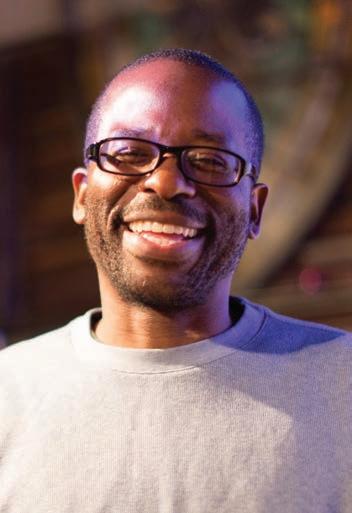
Reed said that he was “delighted” when Active Transportation’s staff underwent anti-racism and implicit bias training after a painful incident highlighted the organization’s blind spots. In August 2017, to celebrate the city of Chicago’s Vision Zero initiative to eliminate serious and fatal crashes, which was launching in African American communities on the west side, the group announced it was hosting a Vision Zero summit.
This was in the wake of the 2014 Laquan McDonald police murder, and about a year after an officer fatally shot Black motorist Philando Castile during a tra c stop in Minnesota. Reed was worried about the potential for increased tra c enforcement through Vision Zero leading to more police harassment and violence against Chicagoans of color.
He argued that holding the summit downtown during business hours, with a $50 admission charge, guaranteed that few west-siders would attend, and noted that all of the announced speakers were white. Since, he said, Black residents would be largely excluded from a conversation that could impact their safety, he called on Active Trans to cancel the event, and the group did so.
Reed said the staff’s participation in the racial sensitivity seminar reassures him that they would support leadership of color, but he’s less confident about the board, which is responsible for choosing the new director and hasn’t undergone such training.
Specifically, he said he’s worried about having a repeat of what recently happened at the LA County Bike Coalition. Executive director Tamika Butler, who is African American and identifies as gender-nonconforming/trans, resigned in 2017 after years of attacks from mainstream cycling advocates who claimed her inclusion of the voices, access issues, and safety needs of marginalized communities in planning and policy discussions was a distraction from implementing livable streets initiatives.
Los Angeles city council candidate and bike shop owner Josef Bray-Ali, who’s of Indian descent, branded her a “concern troll” after she discussed how Vision Zero traffic enforcement might make Angelenos of color less safe. Despite Bray-Ali’s alleged harassment of Butler over the issue, both online and at public meetings, many white male bike advocates continued to endorse him until, and even after, it was revealed that he had made anti-Black and transphobic comments in other online forums.
“We have to get past a narrative that centers cisgender white maleness,” Butler later wrote in a blog post. “I carried this opinion into every room, every speech, and every action I took as [executive director]. This made me unpopular with some members of the bike coalition, some board members, and some people outside of L.A. who constantly critiqued that I was not talking enough about bikes.”
Reed noted that he and other Black bike advocates in Chicago gave a presentation before the Mayor’s Bicycle Advisory Council in December 2014 requesting a more equitable distribution of cycling resources, such as bike lanes, Divvy stations, and bike education programs for African American communities. During the meeting then-Active Trans director Ron Burke asked whether the Black
advocates had data to back up their claim of inequities. “That question . . . felt like a public challenge to us and implicitly came o as if Ron doubted us,” Reed said.
At the next council meeting in spring 2015, the Black advocates presented data and maps that proved their point. Another Active Trans staffer was present, but Reed said he never heard back from the group about endorsing the call for racial equity.
Reed told me that since then, “equity has become a buzzword,” and there seems to be more support at Active Trans for racial justice. In August 2017 the group endorsed a proposal for new fees on development along the gentrifying Bloomingdale Trail corridor to fund a ordable housing. And this spring the group successfully lobbied for $50 million in annual state funding for walking and biking projects, including reforms to make it easier for low-income communities to apply for and receive funding.
But Reed said he still wants Active Trans’s board of directors to undergo the same anti-racism training as the staff. “Should Active Trans hire a Black or Brown executive director, and should everyone from the sta and board be fully committed to racial equity and mobility justice, they will enjoy the full support of myself and Equiticity.”
Shawn Conley, a member of the Major Taylor Cycling Club of Chicago, was one of the Black advocates who presented with Reed, and he shares his interpretation of what happened. “There seemed to be some pushback from Active Trans regarding our request. They advised us that they were going to keep doing things the way they’d been doing things, with bike infrastructure concentrated in neighborhoods with higher levels of cycling, where people are demanding it.”
Charlie Short, who’s white, was working with Active Trans as a consultant to the Chicago Department of Transportation at the time, managing bike and pedestrian safety programs, and was present at the bike council meetings. He also recalls recalcitrance from Active Trans on racial justice issues then. “In the meeting where Oboi and the other Black activists spoke, Ron Burke was superdefensive,” he said. “I felt that Ron was only interested in a certain vision of what active transportation advocacy looked like, and anything outside of that could be dismissed.
.
. . When it came to equity, Ron was insistent that the organization was doing enough.”
Another white former Active Trans employee, who requested anonymity for
12 CHICAGO READER - NOVEMBER 14, 2019 ll
Bike advocate Oboi Reed says he’s encouraged that the Active Transportation Alliance is interested in better representation. COURTESY OBOI REED
CITY LIFE
professional reasons, told me that staff members pushed for equity initiatives and the anti-racism training, but it often seemed like these things weren’t a priority for Burke. “We struggled as an organization to hire and retain staff of color,” they said. “Our good intentions often missed the mark or worse, tokenized our staffers. I always got the impression that equity was something the . . . executive leadership had no experience with and was only willing to ‘check a box’ on meaningfully integrating into our work and
sta development.”
Ron Burke declined to comment for this story.
Peter Taylor, an Active Transportation board member who’s Black, also presented with Reed at the 2014 meeting, and told me he feels there has been positive change at the advocacy group recently. “Oboi has publicly raised issues that few others have, and there has been a noticeable e ect on Chicago’s discourse about mobility and equity.”
Taylor added that, as a board member, he
















can’t speak freely about the executive search. “But equity is at the top of my list of concerns, and I am not alone.”




Board president Bob Hoel, who’s white and is chairing the search committee, confi rmed that. “Our mission clearly states that equity must be at the center of our work.”
Geraci declined to directly discuss Active Trans’s response to the Black advocates’ call for equity, or the aborted Vision Zero summit, but said, “Previous harms related to social and racial justice need to be faced,
and the board and staff has committed to making that journey. This very morning the board expressed to me their eagerness to go down that path, including racial sensitivity training.
“We know we’ve made some mistakes,” Geraci added. “But it’s extremely important to us to be an authentic racial justice- and mobility-justice-facing organization, and that means working from the inside out.” v
@greenfieldjohn

and schedule a meeting with one of our consultants to discuss Medicare and getting the right coverage for you.

Medicare can be confusing, but we’re available and eager to meet with you. We’ll make sure everything you need to know is absolutely clear.
Understand Original Medicare and what it does and doesn’t cover

Learn how our Medicare Advantage Plans give you more benefits We’re happy to meet with you in your home or wherever it would be most convenient for you. Just call and let us know when and where you’d like to get together.
Clear Spring Health is an HMO and PPO plan with a Medicare contract. Enrollment in Clear Spring Health depends on contract renewal. Clear Spring Health complies with applicable Federal civil rights laws and does not discriminate on the basis of race, color, national origin, age, disability or sex. ATTENTION: If you speak Spanish, language assistance services, free of charge, are available to you. Call 1-877-384-1241, TTY/TDD 711. H2020 H5454_0224_M.
NOVEMBER 14, 2019 - CHICAGO READER 13
•
•
(844) 895-9137, TTY/TDD 711 Mon – Fri, 8 a.m. to 8 p.m. ClearSpringHealthcare.com Call
New to Medicare? Let’s grab a cup and get you up to speed.
The Chicago Reader is community-centered and community-supported.







CHICAGO FOR CHICAGOANS
You are at the heart of this newspaper. Founded in 1971, we have always been free, and have always centered Chicago. Help us to continue to curate coverage of the diverse and creative communities of this fabulous city.




Your donation keeps the presses rolling. CHIP IN HERE: www.chicagoreader.com/members

14 CHICAGO READER - NOVEMBER 14, 2019 ll
WANT TO DONATE VIA CHECK? Make checks payable to “Chicago Reader” and mail to Chicago Reader, Suite 102, 2930 S. Michigan Avenue, Chicago, IL 60616. Include your mailing address, phone, and email—and please indicate if you are okay with us thanking you by name in the paper.
RESTAURANT REVIEW

Umacamon upholds the northwestern suburbs’ izakaya tradition

And capably covers all the bases, with sushi, ample comfort foods, and uncommon specialties from the island of Kyushu.
By MIKE SULA
Most people in Chicago don’t consider Japanese food in regional terms, but when Koichiro “K.C.” Kimori was plotting to open Umacamon, his Rolling Meadows restaurant, he was thinking about his hometown, Fukuoka.

Five years ago he was a typical salaryman working at the Elk Grove Village branch of seafood megadistributor True World Foods. That’s when he and coworker Kazushige “Kaz” Homma conceived of an izakaya by night and diner by day, both specializing in the signature foods of the southwestern island of Kyushu.
Kimori—who came to the U.S. to study at the age of 19 and worked in a number of restaurants in Seattle before embarking on a 13-year stretch in the fish business— longed for foods he grew up on, such as soft Hakata-style udon noodles, vinegar-marinated deep-fried chicken nanban, and the Nagasaki-style oddball ramen variant known as champon.
The partners barnstormed the island before opening, reacquainting themselves with the origins of panfried gyoza, Hakata ramen (better known as tonkotsu), and


the restorative beef o al stew motsunabe. But they also had their eyes on what was trending among younger chefs. Adopting Kumamon, the roly-poly ursine mascot of Kumamato Prefecture, as their own, they opened in Rolling Meadows amid the asphalt sprawl northwest of O’Hare, in the suburbs where the region’s Japanese expat community established itself in the 70s, and where a taste of home can be found in long-running izakaya such as Sankyu and Kurumaya.
There are plenty of Kyushu specialties on o er, but Umacamon isn’t simply a specialist. With more than a hundred items on the menu, it also has a dizzying selection of yakitori, sushi, and shareable drinking dishes. At lunchtime the focus shifts to the sushi and homey comfort foods such as donburi, noodles, rich and warming curry rice plates, and a few yōshoku (Western-style) dishes such as a demiglace-glazed burger patty, more meat loaf than sandwich, and omurice, an omelet wrapped in fried rice.
Fukuoka is the historic home of the unctuous, bone-rich ramen style known the world over as tonkotsu, but while Umacamon o ers it, the restaurant’s signature J
NOVEMBER 14, 2019 - CHICAGO READER 15 FOOD & DRINK
Top le : salmon and ikura don; bottom le : JP-style beef curry and salad NICK MURWAY
R UMACAMON JAPANESE KITCHEN | $ 1673 Algonquin Rd., Rolling Meadows 224 318 2489 umacamon.com
BOOK YOUR HOLIDAY PARTY — with — 16” ON CENTER For more info, visit 16oncenterchicago.com/private-events. Mention “reader” when you book! BITE CAFE REVIVAL FOOD HALL 6TH FLOOR REINDEER ROOM MONEYGUN
, a bowl of somewhat lighter chicken-and-pork-based broth filled with noodles, seafood, vegetables, and pork. Keen observers of the soupiverse will recognize the resemblance to its Korean cousin jjamppong, and though its profile is comparatively mellow, it can be ordered spiked with curry or miso. Whether you choose the small or the large, it’s an ample bowl, more than a meal, but nothing compared to the current winter special—a huge tureen of the soup, a

Abundant portioning is the MO at Umacamon even among the izakaya-style “appetizers,” which include a sizable plate of panko-breaded tuna belly; a molten, spicy-mayo-saturated crab salad piled atop avocado halves; and a signature sesame-dressed spinach salad whose wholesomeness is balanced out by strips of crispy burdock root and okonomi-
—the street pancake glossed with Kewpie mayo and a mix of ketchup, soy, and Worcestershire sauce and showered with shimmering bonito flakes—could sub for a manhole cover, and its elevation is boosted by scallops, fat

shrimp, and chunks of pork. But even more minimal bites are generous, like the slabs of grill-kissed rare beef tongue or planks of salted, crispy-skinned mackerel, an inherently assertive fish, here with a lusciousness that suggests Kimori and Homma’s enduring connections in the fish distribution business. (Seafood is delivered each Tuesday and Friday, and the restaurant also puts together the takeaway sushi o erings at the nearby Mitsuwa Marketplace).
The spirit of generosity is certainly lubricated by welcoming hot towels, a lagniappe of silky tofu, Asahi and Sapporo beers on draft, and especially the selection of mostly Kyushu-distilled shochu. But it also demands a certain reciprocal consideration from the guest. If, say, you don’t take advantage of the free iceberg salad bar at lunch, or if you can’t finish everything you’ve ordered, the servers at Umacamon give o a very tangible sense of concern that they’ve disappointed you. You don’t want to worry them.
“People in Fukuoka like large,” says Kimori. “I like big stu too. You want to feel like you get more than what you paid.” v
@MikeSula


ll
MIKE SULA
Search the Reader’s online database of thousands of Chicago-area restaurants at chicagoreader.com/food.
ARTS & CULTURE
COMEDY

Curated Presents: Pork Show
This month the variety show that puts each edition into the hands of a different performer will be taken over by stand-up Eunji Kim. There will be comedians, storytellers, musicians, discussions of food, and an actual feast with a roasted pig. Sat 11/16, 7 PM, Cards Against Humanity, 1551 W. Homer, faebook.com/curatedpresents, $20, $15 in advance.
Freshman: A Show About Your Terrible Early Art
Performers share their early writing, songs, paintings, short stories, videos, and more art originally created in earnest at this cringeworthy night of nostalgia and comedy. Thu 11/14, 7 PM, Transistor, 5224 N. Clark, facebook. com/freshmanchicago. F

Just Us Gals
Clare Austen-Smith and Naomi Spungen host some of the city’s best comedians every month. This time around features Sunny Grissom, Megan Brennan, Jessica Hong, and Maddie Weiner. Thu 11/14, 7:30 PM, Sleeping Village, 3734 W. Belmont, facebook.com/GalsUsJust. F
Las Locas Comedy Presents: ¡The Escorpio Season Show!
Janice V. Rodriguez hosts a night of Latinx stand-ups— and a few lovingly-called “honorary locas.” This month includes Delmy Cabrera, Suzanne Ballout, Yaz Bat, Elise Fernandez, and Laura Hugg. Sat 11/16, 8 PM, District Bar and Grill, 1540 N. Milwaukee, laslocascomedy.com, $15, $5-$10 in advance.
DANCE
Asian Improv Arts Midwest & Links Hall: Bridge Dance Festival
Bridge Dance Festival invites dancers of Asian heritage for a three-night event. The artists in the festival
include Alexander Hayashi w/Takashi Shallow, Ayako Kato, Ayaka Nakama, and Mitsu Salmon w/ Ryotaro. Thu 11/14-Sat 11/16: 7 PM, Links Hall at Constellation, 3111 N. Western, linkshall.org, $15.
LIT
The Chicago Neighborhood Guidebook book release party
A release party for the book with readings by contributors Miranda Goosby, Alex V. Hernandez, Gloria Valle, and Zipporah Auta, as well as discussion with editor Martha Bayne. Thu 11/14, 7-9 PM, Back of the Yards Coffeehouse, 2059 W. 47th, backo heyardscoffee.com. F
Lewis Raven Wallace
The journalist discusses the history of “objectivity” in journalism, its power to silence marginalized writers, and his new book, The View From Somewhere: Undoing the Myth of Journalistic Objectivity, with Reader publisher Tracy Baim. Thu 11/14, 7 PM, Women & Children First, 5233 N. Clark, womenandchildrenfirst.com, registration required. F
PARTY
Chicago Reader Best of Chicago Party
Winners and nominees from the Food & Drink ballot dish out their prize-winning tastes, among them Chicago Diner, Bang Bang Pie & Biscuits, Mia Francesca, Dinner at the Grotto, Publican Quality Bread, the Best Shallot food truck, and Dark Matter Coffee. Best Drag Performer winner Lucy Stoole and Best Stand-Up Comic winner Shannon Noll cohost a Best of Chicago Variety Show, and Best DJ winner Rae Chardonnay spins throughout the evening. Tue 11/19, 7-10 PM, Thalia Hall, 1807 S. Allport, chicagoreader.com/party, $15, $45 VIP.
MasQUEERade Ball
The Queering the Parks Teen Committee hosts a highglam vogue-style ball for LGBTQ folks from 13 to 24

NOVEMBER 14, 2019 - CHICAGO READER 17
R
READER RECOMMENDED b ALL AGES F
The Queering the Parks Teen Committee hosts the MasQUEERade Ball
COURTESY CHICAGO PARK DISTRICT
ARTS & CULTURE
years old. The night features a DJ, hair and makeup stations, photo booth, runway competitions, and prizes. Sun 11/17, 6-10 PM, Columbus Park Refectory, 5701 W. Jackson, chicagoparkdistrict.com/events/ queering-parks. F
THEATER
The Niceties
A white female Ivy League professor and a Black female student clash over the latter’s thesis in Eleanor Burgess’s drama, directed by Marti Lyons and starring Mary Beth Fisher and Ayanna Bria Bakari. Through 12/8: Tue-Fri 7:30 PM, Sat 3 and 7:30 PM, Sun 2 and 6 PM; also Wed 11/27 and 12/4, 3 PM; no performances 6 PM Sun 11/10 and 12/8, 3 PM Sat 11/9, or Thu 11/28, Writers Theatre, 325 Tudor Ct., Glencoe, writerstheater.org, $35-$80.
Queen of Sock Pairing
Red Tape Theatre continues its season with the world premiere of Sophie Weisskoff ’s story of Celia, a woman who feels unappreciated at work and in her relationship. She enlists her older boyfriend to role-play as her employer’s estranged husband, with unintended consequences. 11/15-12/14: Fri-Sat 8 PM, Sun 3 PM, Mon 8 PM (industry), Ready Theatre, 4546 N. Western, redtapetheatre.org. F
Waiting for Godot
Former Victory Gardens artistic director Dennis Začek directs Samuel Beckett’s seminal 20th-century classic about two tramps and the mysterious figure they wait for day a er day. The cast includes Larry Neumann Jr. as Vladimir, Michael Saad as Estragon, Larry Russo as Pozzo, Nima Rakhshanifar as the unlucky Lucky, and Cooper Hoyt as the boy. 11/15-12/15: Wed-Sat 8 PM, Sun 4 PM; also Sat 11/30, 4 PM; no performance Thu 11/28, Victory Gardens Theater, 2433 N. Lincoln, victorygardens.org, $20-$40.
VISUAL ARTS
Five Works: Kelly Kristin Jones
Mana Contemporary is hosting “Five Works,” a bimonthly project series that features five new or recent works from Chicago artists. Kelly Kristen Jones’s photo-based works will be on display. Free but RSVP is recommended. Opening reception Fri 11/15, 6-8 PM. Through 1/11: Mon-Fri 11 AM-5 PM, Sat noon-4 PM, Mana Contemporary Chicago, 2233 S. Throop, manacontemporarychicago.com.
“Impure Thoughts”
A show from Jessie Mott and William Krug that features eight years of queer paintings. Wine and snacks served at the reception. Fri 11/15, 6-8 PM, Center on Halsted, 3656 N. Halsted, centeronhalsted.org, $5 suggested donation.
Untitled (Red Flame)
Oslo-based artist Camille Norment presents a new sound installation at the Logan Center Gallery. The Great Chicago Fire and riots in the 60s are referenced in the piece, which was created during a series of workshops with Chicago residents. 11/151/5: Tue-Sat 9 AM–9 PM, Sun 11 AM–9 PM, Logan Center for the Arts, 915 E. 60th, arts.uchicago. edu. v
LIT
Lynda Barry gives a master class in creation in Making Comics

The comics artist’s latest book is the culmination of lessons learned in her decades-long career.
By SALEM COLLO-JULIN
R MAKING COMICS
By Lynda Barry Drawn & Quarterly

Lynda Barry is now o cially a genius. She was bestowed with the title MacArthur fellow this September along with 24 other creative people from a variety of fields. The fellowships, commonly referred to as “genius grants,” reflect the achievements and prowess of the individuals who receive it,
but her fans have been calling out her genius for years.
Despite this lofty title, Barry has a reputation for being humble that dates back to her college years in the 70s at Evergreen State in Washington, where friends Matt Groening and John Keister secretly published Barry’s first comic strips in their college newspapers without her knowing because they all knew that she would never do it on her own. They called Barry’s strip Ernie Pook’s Comeek, and their gamble paid off—the strip eventually ran weekly in newspapers all over the country (starting with this one), and Lynda Barry’s characters made their way into books. Barry’s 1988 graphic novel The Good Times Are Killing Me was adapted into a play that did well both here in Chicago and o -Broadway in New York.
Readers of Ernie Pook’s Comeek can attest to Barry’s abilities without hearing about any of these accolades. Her characters travel
through awkward interpersonal emotional landscapes and, in the case of Marlys especially (the tween little sister with freckles, glasses, and the mind of movie director), create new worlds for themselves when the existing world doesn’t deliver on its potential. In a 1986 strip titled “Talent Show,” Marlys and older sister Maybonne are stuck visiting cousins, and we see the variety show that they perform for each other, doing their best vampire impressions and getting the family dog involved out of boredom. “I will now eat the six raw hot dogs without stopping till they are gone,” Maybonne announces into the broomstick that she reimagines as a microphone. “The music to it will be ‘Revolution’ by the Beatles.” Barry, who’s associate professor of interdisciplinary creativity at the University of Wisconsin-Madison, has been teaching and sharing her craft for the last few decades. Her newest book from longtime publisher Drawn & Quarterly is this fall’s Making Comics, which is both an instructional course in storytelling through the comic strip format and a guide to centering one’s thoughts in creativity. Her instructions in Making Comics seem less from Professor Barry (the book’s 2014 predecessor, Syllabus, gives us a little bit more classroom structure) and more from Lynda, the friend who secretly created Marlys and Fred Milton the Poodle and sometimes has cruddy days too (but here’s a pen and notebook paper—just draw yourself in a Halloween costume and let’s get through this together). It feels like taking a class from Marlys while stuck in the living room at your cousin’s house, and it’s a delightful, shed-your-inhibitions-about-yourtalent kind of instruction. v
@hollo
18 CHICAGO READER - NOVEMBER 14, 2019 ll
COURTESY
DRAWN & QUARTERLY.
MAKING COMICS BOOK RELEASE PARTY Mon 11/ 18, 5: 30 PM (doors open at 4: 30 PM), Hideout, 1354 W. Wabansia, $ 5, sold out.
B
18, 8 PM, Cafe
2313 N. Milwaukee, facebook.com/ ladylikechicago, $ 5 suggested donation.
Ladylike lets women be as gross as they please
The live show and podcast aim to shake the shame from our most disgusting moments.
By BRIANNA WELLEN
Bodies are gross. It’s true of all bodies, but while men are often encouraged to embrace the disgusting, women are often taught to be ashamed of it. The comedy show and podcast Ladylike encourages women and nonbinary folks to celebrate the sickening by sharing their stories about blood, guts, sex, puke, and feces galore.

“Basically your whole life not only are you not supposed to think it’s funny but you constantly have to hide it, and that can be really exhausting and frustrating,” says Lady-
like cofounder Gena Gephart. “So to go up to a microphone and say, ‘I shit my pants on the bus,’ I think it is kind of empowering. I think it’s empowering to reclaim the quote unquote ‘unladylike’ parts of our bodies and behavior.”
During the live show, which takes place on the third Monday of every month at Cafe Mustache in Logan Square, comedians and musicians tell their grossest stories onstage, often to a packed house. (Full disclosure: the first time I attended I was a performer on the show and talked about all the times my
Gena Gephart SARAH LARSON
& CULTURE
like, ‘It was me!’” Gephart says.

Inspired by other storytelling shows like This American Life and the Moth , Gephart started recording the performances for a weekly podcast in November of last year. She didn’t want to waste the opportunity to collect all the stories being told every month and share them with more people to continue breaking down the stigma around gendered grotesqueness.
bodily functions had betrayed me in front of an attractive nurse during a weeklong hospitalization.) Before the show starts, members of the audience can anonymously submit their own disgusting confessions to be read onstage in between acts—though Gephart says most people end up proudly owning up to the stories. One such instance that’s stayed with her is when a woman in the audience wrote down a story about a sexual encounter that involved her big toenail drawing blood from the inside of a man’s mouth. “She did stand up and was
While women and nonbinary audiences have embraced the show, Gephart does wish that more men would attend. Not only would they be treated to a fun and hilarious night, but they also might learn a thing or two about the unnecessarily mystifying female body. And performers are more than happy to tell every nitty-gritty detail to assist in that education.

“Most people when I ask them to do the show are like, ‘Oh, I know exactly what story I’m telling,’” Gephart says. “Everyone’s got a nasty story that they’ve just been waiting in the wings with.” v
@BriannaWellen
NOVEMBER 14, 2019 - CHICAGO READER 19
COMEDY
ARTS
RLADYLIKE Mon 11/
Mustache,
Based on the New York Times bestseller that became an Academy Award-winning film Best of Chicago 2019” Winner: Best Opera Company Best New Local Opera Production “
Photo: Ken Howard













































































20 CHICAGO READER - NOVEMBER 14, 2019 ll $15 $45 VIP Tickets at chicagoreader.com/ bestofchiparty Tuesday, November 19 VIP 6-7pm Party 7-10pm Thalia Hall 1807 S. Allport All Ages More than 30,000 ballots were cast across More than 300 categories deterMining your favorite people, places, and things in the city. The people have spoken, now it’s time to party! wheelchair accessible. parking available on the street or via valet for a fee.










NOVEMBER 14, 2019 - CHICAGO READER 21 Taste the Best of Chicago Lucy and Shannon's Best of Chicago Variety Show! Chicago Diner Bang Bang Pie & Biscuits Parson’s Chicken & Fish dante’s pizzeria Dinner at the Grotto smoque bbq publican quality bread virtue cider dark matter coffee koval distillery half acre beer company Mia Francesca’s
Shannon
Noll Best Stand Up Comic
Lucy Stoole
Best Drag Performer Rae Chardonnay Best DJ Runner Up Best Photobooth
Photobooth by
Featuring a grab bag of the Best of Chicago from magic to musicians.
R VIHANGA
Vihanga.co, individual items $ 50 -$175
Vihanga has arrived
By KERRY CARDOZA
Vihanga Sontam always wanted to start her own fashion label. Growing up in a small town six hours from Hyderabad in southern India, it was imperative to wear comfortable, breathable garments. Sontam says it’s common to buy fabric and bring it to a tailor to make your clothes for you by hand.
“Everyone wears handmade garments there, and it’s a given thing that you buy cotton because you can breathe in it more,” she says. “Here, it’s like, ‘It’s handwoven?! Oh my God, it’s not done by a machine?’”
After receiving her MFA in fashion from
the School of the Art Institute, Sontam joined forces with her now-husband, Miles Jackson, who has a background in sculpture, to launch Vihanga. They focus on creating small, handmade collections in an ethical, sustainable, and all-around-thoughtful way. Vihanga’s pieces tend to have fluid, simple designs that toe the line between formal and informal, masculine and feminine.

Starting the business in Chicago wasn’t always part of the plan. Though Sontam was studying here, she planned to move back to India after school and start her label there. But soon after graduation, she met Jackson. They
“did long-distance” for a while, until Sontam moved back to Chicago in summer 2018.
“We were like, ‘Why not start it in Chicago?,’ because we have such a great community here,” Sontam says.
Their first collection launched in March: ten pieces made in rich earth tones. The spring/ summer collection was titled Arrival, and the campaign for the clothing was photographed in a stylized airport security area. The models appear in stocking feet, their shoes in a plastic bin—in one image, a security guard holds a metal detector under a model’s armpit. It’s meant to be cheeky, but it’s also based on the
real-life trials of flying in and out of the U.S. as a nonnative.
“The inspiration comes from these political things that we were experiencing when we were doing long-distance,” Sontam says. “It was really hard for me to come back multiple times to the U.S. because they’re like, ‘Oh, you graduated, why are you back?’ They kind of pull you into a room and traumatize you. It was very traumatizing and at the same time, we didn’t want to take it so seriously and kind of flipped that anxiety into our work.”
The name “Arrival” in some ways also refers to the materials. Sontam and Jackson brought all the fabric for the debut pieces to the U.S. from India in two huge suitcases. They hope to continue sourcing most of their fabric from India, though the material for the fall/winter collection came from New York because cold-weather fabrics like wool aren’t common in the subcontinent. Still, all the pieces have flowing, loose-fitting silhouettes. The new collection began launching on September 23; they staggered its release, adding one new item to the website each week, with the final item out this week. A pair of red, high-waisted, wide-weft corduroy pants has already sold out. An iridescent red long-sleeved crop top with a blue overlay is another customer favorite.
For Jackson and Sontam, it’s crucial to be intentional with each component of their business. When Sontam was working as a designer’s assistant in Mumbai, she witnessed firsthand the exploitation of low-wage garment workers.
“There’s di erent kinds of exploitation everywhere in the industry,” Jackson says. “But the base of it is the actual labor, and those are the people who aren’t getting paid enough or have bad working conditions. And that’s
22 CHICAGO READER - NOVEMBER 14, 2019 ll ARTS & CULTURE
FASHION
The handmade clothing line offers ethical and sustainable fashion for all.
Models Zohair Hussain and Lamiah Gholar Father Tongue long-sleeved shirt and Sitara crop-top from Vihanga’s fall/ winter 2019 collection.
EVAN SHEEHAN AND ALEX WALLBAUM; MAKEUP ARTIST: ARIELLA GRANADOS
J
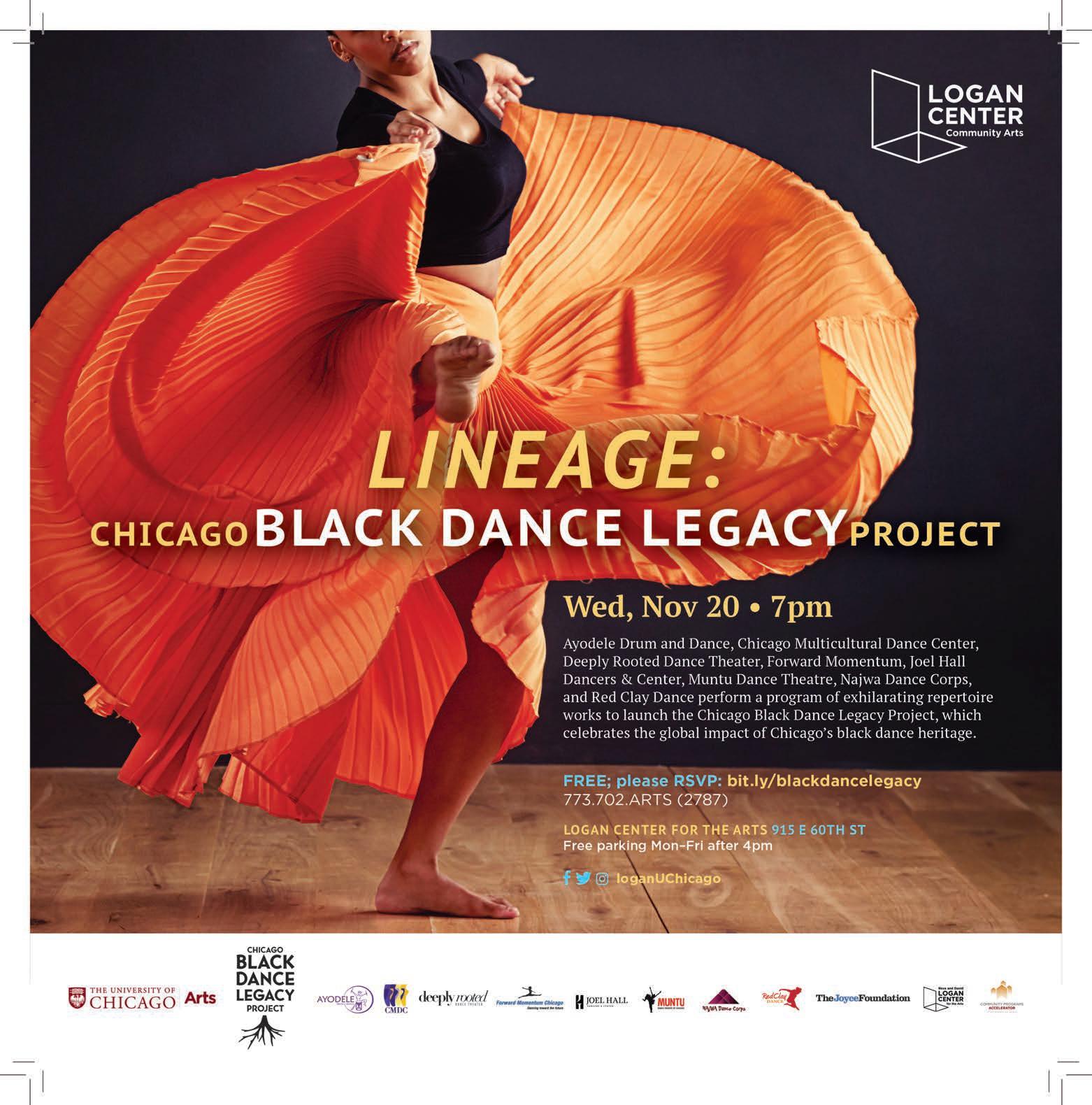
Less scrolling. More strumming.











ARTS & CULTURE

Right: the Hibiscus long sleeve shirt and Pleader pants from Vihanga’s fall/winter 2019 collection; Below: Miles Jackson and Vihanga Sontam

really important for us—that we start at a point where we’re like, ‘Are we doing this ethically? Do we know the person who’s doing it for us? Do we have a relationship with them?’”
Sontam currently makes all the clothing by hand; the online-only label is small enough that it’s a sustainable workload. “Every time I’m making something for someone, I know exactly where it’s going, and I know how much time and e ort goes into making a garment,” she says. “Every time I go out to a huge brand, they’re selling T-shirts for like $5, I’m like, ‘Do you actually pay a person to make this?’”
Pieces in the current collection range from $50 to $175, and each one is made to order— that means Vihanga can make clothes for any body type. And the items are purposefully marketed as unisex.

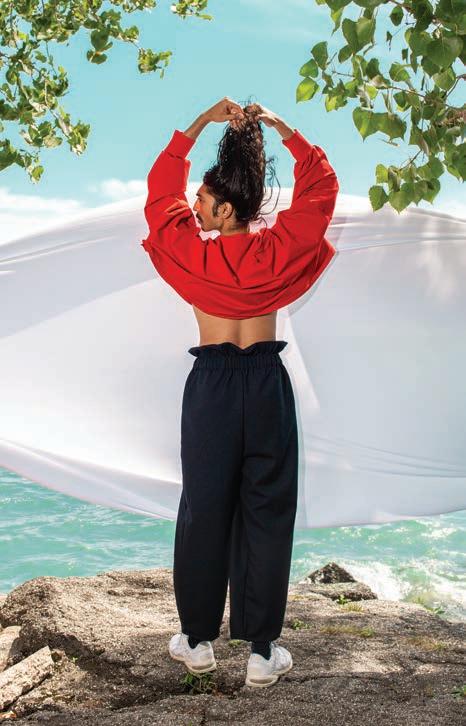
“I think that, even though we’re not a queer brand, it is important that we maintain a certain allyship to that, and just be aware that we can produce things that are more masculine or more feminine, but we aren’t necessarily going to say who should wear what,” Jackson
says. “Anyone can buy anything.”
Vihanga is a local embodiment of how the fashion world is changing; the recent declaration of bankruptcy by luxury behemoth Barneys is a case in point. Consumers don’t rely on corporations for trends like they used to, and they’re starting to care more about the toll fashion takes on the environment and the workers making the clothes. More and more brands are focusing on making the industry more sustainable, from incorporating recycled materials into their garments to staging carbon-neutral fashion shows. Labels like Chromat and Savage X Fenty are unabashed in their desire to make clothes for all bodies and all people.
“The standard—what you’d consider the pillars of fashion, are dissolving in a way, and I think that we’re in an exciting point for lots of people, but especially for us where there’s so much openness,” Jackson says. “As long as you’re doing something that feels authentic, that’s key.” v
@booksnotboys

24 CHICAGO READER - NOVEMBER 14, 2019 ll
EVAN
SHEEHAN AND ALEX
WALLBAUM;
MODELS: ZOHAIR
HUSSAIN
AND LAMIAH GHOLAR;
MAKEUP
ARTIST: ARIELLA
GRANADOS;
WILLIAM CABANISS
continued from 23
New group classes forming now. oldtownschool.org Give your digital life a break. Connect over music, dance & more.
DANCE REVIEW

The circle of Rink Life
Lucky Plush explores community and commitment via the roller rink.
BY IRENE HSIAO
Ah, the roller rink—a community center where everyone keeps moving in circles, forever, to retro pop songs, in colored slacks and bowl cuts. There is no time there.
There is no world beyond its borders. There’s only the supremely charming Lucky Plush ensemble, sliding their bare and socked feet over the Marley flooring in Steppenwolf’s blackbox theater. Rink Life, devised by director Julia Rhoads in collaboration with the ensemble, brings life to this insular society, where everyone mostly gets along most of the time.
“Do you remember what you told me?” asks Mindy (Melinda Jean Myers, stepping into a
the show. “I’ve told you many things,” replies Michel (Michel Rodriguez Cintra). It’s a dodge that creates a loop of action and conversation, all wrapped in a haze of nostalgia, which is how things happen on the rink. Mindy and Michel rehearse their duet, but their timing is o . They try to sing together, but they can’t remember the words.
Everyone sings on the rink, sometimes in tight harmonies that rub the room into a resonant glow, other times in a cacophonous mess of earworms. Often, they practice, standing in a semicircle making solfege hand signs. They take a similar stance to indicate listening or “holding space” for each other, as they call it: the palm up and extended. (It’s a pun—the opposite of “mi,” get it?)
Commitment is the recurrent theme of the piece: Jacinda (Jacinda Ratcli e) has returned from being elsewhere, but is she here for a full membership or only for a day pass, Kara (Kara Brody) wants to know. When Jacinda slips right back into the groove in an intricate duet


ARTS & CULTURE
with Michel, Mindy wants to know how to get him to show up for rehearsal with her. Everyone is anxious about the idea—Mindy even took a “marriage fitness survey” before her wedding (the only reference to an o -rink relationship, but all the rink regulars were there for it, so was it really extracur-rink-ular?).
Performing commitment and forming community occur in the same activities on the rink, whether it’s singing, dancing (ahem, skating), or playing games (varieties of Keep Away, Red Rover, and the dozens). Lucky Plush has a wonderful trick of producing moments of unison, balance, and coordination that arise like miracles from disorder. In Rink Life, these structures are immediately disrupted by each character’s pesky personal needs and proclivities. “I wasn’t feeling that,” says Jacinda to Kara and Kara to Jacinda, each choosing a different method of negotiating each person’s responsibility to the group. Yet the final images—of individuals momentarily and impossibly levitating in space, supported by the others— resolve the work beautifully. v
@IreneCHsiao
NOVEMBER 14, 2019 - CHICAGO READER 25
Rink Life BENJAMIN WARDELL
R RINK LIFE Through 11/ 17: Thu-Sat 8 PM, Sun 2 PM, Steppenwolf 1700 Theatre, 1700 N. Halsted, 312 335 1650, luckyplush.com, $15 -$ 40. All performances currently sold out; call for information about waiting list.
R READER RECOMMENDED
REVIEW
Cultural appropriation gets a reality check
Reality TV and hip-hop mash together in P.Y.G. or the Mis-Edumacation of Dorian Belle
By KERRY REID
There are two specific places in Tearrance Arvelle Chisholm’s P.Y.G. or the Mis-Edumacaton of Dorian Belle that are likely to change every time this play (which premiered in Washington, D.C., this past April) hits the stage. One is a montage of news reports on unarmed Black people killed by police and other acts of white supremacist terror, such as Charlottesville. The other is a scrolling list of rappers killed in 2018—in the script’s stage directions, Chisholm provides a list, adding “update accordingly” for the latter. Lili-Anne Brown’s staging for Jackalope updates both segments—the montage opens with Atatiana Jefferson’s killing and the scroll includes Nipsey Hussle.
Together they form the “double-edged gat” in the play, to quote the lyrics of P.Y.G., or Petty Young Goons, the hip-hop duo hired to help a Justin Bieber-like Canadian pop star develop a harder musical edge and persona while living
with him on a reality show, The Mis-Edumacation of Dorian Belle . They also provide reminders of violence and racism outside the walls of both the onstage reality-television house (neatly captured in Lauren M. Nichols’s design) and of the theater.
As the title implies, there’s a Pygmalion element to Chisholm’s play, with the two Black mentors, Alexand Da Great (Tevion Devin Lanier) and Blacky Blackerson, or just “Black” (Eric Gerard), filling in as Henry Higgins and Colonel Pickering to Garrett Young’s privileged and clueless Dorian. Initially, Lanier’s Alexand plays mediator to Black and Dorian’s fraught relationship. He also cautions Black to back o on using the N-word on camera “because we in mixed company,” which results in Black carrying a buzzer from the game Taboo and hitting it in place of the word—which makes its repetition feel even more jarring, though hilarious.
But as the story unfolds, Black develops
an honest a ection for Dorian (cemented on a skiing trip to Canada), while Alexand feels more discomfited about why they’re doing this project at all (aside from money and exposure, naturally). Angry feedback from “Black Pique” (think Twitter) reinforces the sense that P.Y.G. are selling out.
Chisholm’s play steers away from easy didacticism even as he takes shots at everything from Hamilton to hip-hop artists who embellish their street cred. (Alexand keeps reminding Black that they’re from Naperville, not Chicago.) But the biggest satirical gats come out in a running series of television ads aimed squarely at unexamined white privilege—all featuring a gallery of storefront stalwarts marketing things like “White Man Shoes,” footgear that magically allows you to cut lines and stand on the backs of others, and “White-Coy,” an app that lets Black people call for a white “ally” so they don’t get arrested (or shot) for existing in public.
What gives this show heart as well as heat is that Chisholm’s take-no-prisoners approach still lets us feel sympathy for the characters. Young’s Dorian, the stand-in for every prepackaged Boy Band Blandster imaginable, sincerely wants to understand P.Y.G.’s influences, though that takes the form of telling Black and Alexand “I even took a hip-hop course at an HBCU. It was online. But still.” But then he goes into an exploration of how he has chased “the beat” around the globe that makes it clear he’s trying to be more than a cultural tourist in his own bumbling way.
R P.Y.G. OR THE MIS-EDUMACATION OF DORIAN BELLE
Through 12/21: Fri-Sat 8 PM, Sun 3 PM; also Thu 11/ 14 and 11/21, 8 PM, Jackalope Theatre, Broadway Armory Park, 5917 N. Broadway, jackalopetheatre.org, $ 35 reserved, $27 general.
All three men bond over the complex relationships they have with their parents. Dorian is estranged from his “momager,” Alexand gets regular phone calls from his mom telling him what to do, and Black recalls that his father helped him become a rapper by making him sit down with a dictionary and come up with a hundred different words for each of the obscenities he’d been tossing around. “‘Eviscerate.’ I love words like that, words that sound like what they mean. That word sound like draggin’ a razor blade across some neck skin.” Against the backdrop of fame (or nascent fame, in P.Y.G.’s case), they’re just three guys barely out of adolescence, trying to make sense of their place in the music scene. (Aaron Stephenson’s sound and music design adds texture and nuance throughout the show.)
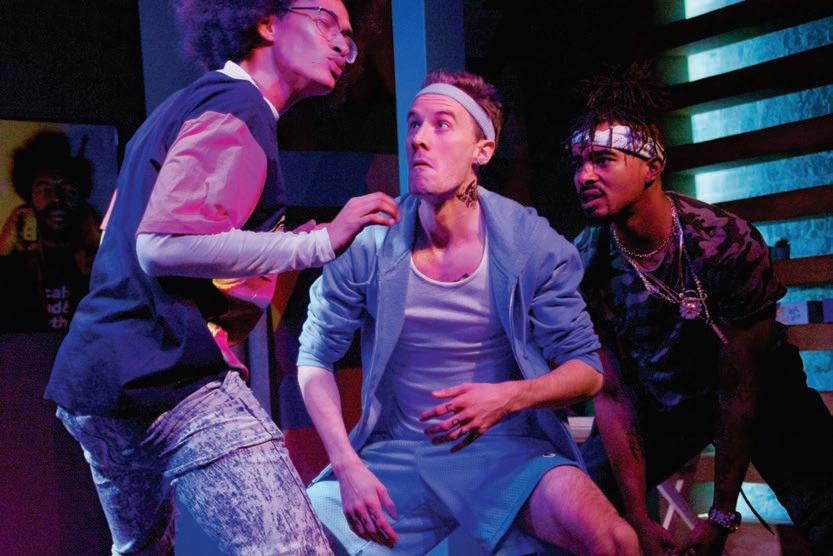
Of course, for Alexand and Black, that place is always circumscribed by race. Black decries the “crabs in a barrel” mentality of Black Pique, but unlike Dorian, both he and Alexand know that what they do or don’t do will be used as a yardstick for measuring other Black people, not just themselves. By the end of Brown’s smart, savvy, and sometimes achingly truthful production, we’ve seen the “double-edged gat” of cultural appropriation lay open these characters in surprising and hard-to-forget ways.
@kerryreid
26 CHICAGO READER - NOVEMBER 14, 2019 ll THEATER
P.Y.G. or the Mis-Edumacation of Dorian Belle REED CARSON
b ALL AGES F
v
OPENING
In the realm of the senseless Second City’s latest main-stage revue revels in our unfathomable times.
A year ago, Second City unveiled Algorithm Nation or the Static Quo, a grim affair featuring simulated onstage shootings and torture as well as an extended rant from an unapologetic female Trump supporter. In its place, we now have the 108th main-stage revue, Do You Believe in Madness?, a more endearing though frustratingly shapeless endeavor directed by Ryan Bernier and featuring a brand-new cast devoted more to nodding sympathetically (and occasionally nudging us in the ribs) about the ongoing disruptions of life in these dis-United States than to fanning the flames.
Well, we do meet the distaff equivalent of the Internet’s “Florida Man” in Sarah Dell’Amico’s Sunshine State denizen who urges us to make like the UK and vote for “Flexit.” (Don’t get too comfortable, Indiana—you’re next on her list.) On the other end of the national-identity spectrum is Jordan Savusa, who strums a ukulele while reminding us that, though he is from Hawaii (and yes, idiots, it’s part of the United States), “Hawaiian” refers to Indigenous people in the 50th state.
This revue also focuses successfully on slice-of-life two-character scenes. One of the strongest involves a woman in her 50s (Dell’Amico) going to an abortion clinic with her daughter (Asia Martin)—the catch being that it’s mom who is seeking services. (“My first one.

You’re welcome.”) But maybe the best sign of how exhausting and crazy-making these times are comes in a Hee Haw-esque number whose lyrics are composed entirely of the names of everyone who has resigned from the Trump administration. It’s funny, but it seems to go on forever, with no sign of when the insanity will stop. —KERRY REID DO YOU BELIEVE IN MADNESS?
Open run: Tue-Thu 8 PM, Fri-Sat 8 and 11 PM, Sun 7 PM, Second City main stage, 1616 N. Wells, 312-3373992, secondcity.com, $31-$58.
R Heart of the matter

An opera singer tries to connect with the man who got her late husband’s heart in Exquisita Agonía.
Nilo Cruz’s plays o en center on people suffering displacement and trying to find distractions for that pain, as in his 2003 Pulitzer Prize-winning Anna in the Tropics, about a group of Cuban immigrants working in the cigar industry in 1929 Florida who take comfort from hearing Anna Karenina read aloud—and like Anna, engage in their own passionate infidelities. In 2018’s Exquisita Agonía the characters are caught between life and death, past and present. Marcela Muñoz’s staging for Aguijón Theater (presented in Spanish with English supertitles) captures their pain and disruption while also raising some interesting questions about what makes us who we are.
Millie Marcel (Rosario Vargas) is an opera singer
NOVEMBER 14, 2019 - CHICAGO READER 27
A highly anticipated world premiere production – with live music from LADYSMITH BLACK MAMBAZO – in a stunning, otherworldly story that explores the sacrifices we make for love. By ensemble member Eric Simonson Music by Ladysmith Black Mambazo Directed by ensemble member Eric Simonson and Jonathon Berry MAJOR PRODUCTION SPONSORS NOVEMBER 7, 2019 – JANUARY 5, 2020 steppenwolf.org | 312-335-1650 Tickets start at just $20LAURENTS/HATCHER FOUNDATION HELEN ZELL LINDIWE Groups of 6+ enter code GROUP6 and get $10 o each ticket! THEATER
THEATER
desperate to find the recipient of her late husband’s heart. A er she exchanges letters with the young man, Amér (Israel Balza), they decide to meet—and it seems clear that Millie wants more from Amér than just to listen to her beloved’s heart one more time. Amér has also felt different since the transplant, and wonders if some part of the dead man’s character has now become infused with his own.
Amér, his pragmatic brother, Imanol (Sándor Menéndez), and his doctor (Elio Leturia) finally meet Millie’s family. A host of unresolved issues involving Millie’s children—pregnant daughter Romy (Andrea Leguizamón) and especially son Tommy (Victor Salinas)—come flooding out in ways both lyrical and nakedly wounding. Yet through all the rage and revelations, Cruz’s story and this production both remain animated by the empathetic cast. It’s a sharp and bittersweet reminder of the need to keep one’s heart pumping and hope alive even in the most dislocating of circumstances.
—KERRY REID EXQUISITA AGONÍA Through 11/24: Thu-Sat 8 PM, Sun 6 PM, Aguijón Theater, 2707 N. Laramie, 773637-5899, aguijontheater.org, $30, $15 students, seniors, and teachers.
R The things he carried
A gay man comes to terms with his Iowa roots in Packing.
Living out and proud in a coastal queer mecca full of historic gayborhoods, vocally supportive senators, and Hamburger Mary’s locations is one thing; learning to love yourself in rural America can be another. For writer and performer Scott Bradley, embracing himself and his upbringing a er returning as an adult to his roots in Iowa (he attended the Iowa Writers’ Workshop) meant reckoning with the ghosts and self-doubts from which he thought he’d long escaped.
Directed by Chay Yew, Bradley’s autobiographical 90-minute solo work Packing hits a lot of notes that will ring familiar to audiences of LGBT theater: there’s a neglectful and abusive father who resents his son’s gait and mannerisms, a sexual awakening wrapped in shame, a brief refuge in the highs of a risky party scene, and the sobering chill of surviving an epidemic. But the ubiquitousness of the elements of Bradley’s journey isn’t a negative here. Instead, when paired with deeply personal, vivid memories of his coming of age—like the euphoria of his first Cher concert or the joy he felt the first time a disclosure of his sexuality was met with a shrug instead of a panic—Bradley and About Face Theatre create an important document of queer life only a decade or two in the past but a world away culturally.
I was reminded throughout of Steven Strafford’s Methtacular!, also presented by About Face a few years ago, which touched on similar serious themes and used comedy to make harrowing plot points more cutting or palatable. A bit more humor here would serve Bradley’s o en painful story well, but the warmth expressed in his acceptance and love for his midwestern home is undeniable. —DAN JAKES PACKING Through 12/7: Thu-Sat 7:30 PM, Sun 3 PM; also Sat 11/30, 3 PM; no performance Thu 11/28, Theater Wit, 1229 W. Belmont, 773-975-8150, aboutfacetheatre.com, $20-$38.
West Side gory
Chicago Shakespeare’s Romeo and Juliet focuses on violence, not romance.

Setting Romeo and Juliet in a contemporary urban setting inevitably draws comparisons to West Side
Story, even though Barbara Gaines’s current staging for Chicago Shakes (the first time she’s ever directed the play) resists that interpretation by casting the warring Montague and Capulet families across racial and ethnic lines. Mr. Capulet (James Newcomb) is a soused WASP, while Mrs. Capulet (Lia D. Mortensen) is in MILF mode, hooking up with Nate Burger’s Mercutio at the party where their Black daughter first sees the Latinx Romeo.
But there’s a frustrating lack of contextual specificity here that makes it harder to understand the forces driving the central lovers apart, despite beguiling performances from Brittany Bellizeare as a forthright Juliet and Edgar Miguel Sanchez as a histrionic Romeo.
For example, the thumb-biting insult in the first scene now comes from the elder Capulet—yet the hotheaded man showing off for the angry younger men of his tribe on the basketball court turns expansive host, concerned about preserving niceties at his party.
(Setting the balcony scene on Juliet’s porch, with her dad passed out in a lawn chair mere feet away, is a fun choice, though.) The violence in the fight scenes (directed by Rick Sordelet) is bloodier than what I’ve seen in past productions, but the roots of that violence as they relate to current socioeconomic conditions in Chicago remain murky, which ends up distancing us from the urgency of the young lovers’ plight. The text is clear, the humor is sharp, and the physical staging crisp—but Gaines hasn’t found a way to articulate what this play in this setting really says about our city today. —KERRY REID ROMEO AND JULIET Through 12/22: Wed 1 and 7:30 PM, Thu-Fri 7:30 PM, Sat 3 and 8 PM, Sun 2 PM; also Sun 11/17 and 12/8, 6:30 PM; Tue 12/17, 7:30 PM; and Thu 12/12, 1 PM; no performances Thu 11/14 and 11/28, Chicago Shakespeare, 800 E. Grand, 312-5955600, chicagoshakes.com, $35-$90.
Same old song and dance Sombras Tango Cabaret gets tangled up in cliches.
Originating on the streets of Argentina, filtered through European high society, blending African rhythms and immigrant spirit, tango, like a fine perfume, marries sophistication with an undertone of flesh. But if your primary association with tango is corniness, Sombras Tango Cabaret, created and directed by Jorge Niedas and Liz Sung for Tango 21 Dance Theater, with choreography by
Niedas and writing by Sung, brings it to another level. You won’t see roses clenched in anyone’s teeth, but this pastiche of Cabaret and every summer stock show there ever was makes for a mostly cringeworthy evening.
The primary character is cabaret host Fantastik Frank (Trent Oldham), who narrates the evening in a mid-Atlantic accent, just one piece of artifice in his bleached-blond, red-sequined, high-heeled, fishnetted, half-painted ensemble that becomes deeply annoying over the course of the evening. Frank always knew he was “flamboyant” (he says), so he ran away with a

28 CHICAGO READER - NOVEMBER 14, 2019 ll
Exquisita Agonía CARLOS GARCÍA SERVÍN
The Steadfast Tin Soldier LIZ LAUREN
B
Parisian tango company. His chosen family accepts him for who he is, but does he accept himself, he wonders, gazing into a lighted mirror.
The high point of the evening is a lovely barefoot dance to Astor Piazzolla’s “Tzigane Tango” by Valentina Muñoz and Jonathan Ropiequet, who incorporate a length of lamé into their duet with grace and ease, almost creating the illusion of floating and twining on aerial silks. Live music by Bob Solone, including some original compositions, is delightful. And KT McCammond, in the role of Frank’s long-estranged mother, belts her number with a surety that belies far better experiences. —IRENE HSIAO SOMBRAS TANGO CABARET Through 11/17: Fri-Sat 8 PM, Sun 3 PM, the Edge Theater, 5451 N. Broadway, 847-701-5682, tango21dancetheater.com, $30 advance, $35 at the door.
R Quiet wonder
Mary Zimmerman’s The Steadfast Tin Soldier returns to light up Lookingglass.
Marionette-like figures in colorful, exaggerated costumes dance on and off the stage, opening little doors to reveal light boxes with wreaths, dolls, and other tokens of Christmastime before Mary Zimmerman’s transcendent adaptation of this Hans Christian Andersen fairy tale even begins. It’s a signal that there’s something special behind closed doors and, indeed, this production is a delight from start to finish, all the more amazing for the
fact that nary a word is uttered.

The story of a one-legged toy soldier’s travails is told through pantomime, evocative puppetry (by Chicago Puppet Studio), and the ingenious use of props to seamlessly move the narrative along. When words appear, they’re printed on toy blocks, in thought balloons, or as song. Yet scene to scene, whether it’s the soldier, ballerina, rat, or fish, the characters change scale and dimension as is usually only possible in books or animation. We see an actor disappear behind a fluttering sheet that stands in for water or fire and reemerge as a doll and not for a moment do we suspend belief. Such is the spell that these magicians cast.

I have not been a child for a very long time and don’t know what kids like these days, but this performance filled me with a kind of preverbal wonder. Unlike so much holiday treacle, Lookingglass’s production doesn’t sugarcoat the tragedy inherent in old fairy tales. It’s worth at least a bushelful of moldy Peter Pans and Nutcrackers and deserves to be performed every year in their place. I had a smile on my face the whole time, except when I was wiping away tears. —DMITRY SAMAROV THE STEADFAST TIN SOLDIER Through 1/26: Tue-Wed 7:30 PM, Thu 2 and 7:30 PM, Fri 7:30 PM, Sat-Sun 2 and 7:30 PM; also Wed 11/27, Fri 11/29, and Tue 12/24 and 12/31, 2 PM; check website for holiday schedules, Lookingglass Theatre, Water Tower Water Works, 821 N. Michigan, 312-337-0665, lookingglasstheatre.org, $45-$85. v

NOVEMBER 14, 2019 - CHICAGO READER 29
Packing CODY JOLLY PHOTOGRAPHY
THEATER
FROM
THE COMBINED TALENTS WHO PENNED ANNIE GET YOUR GUN & THE SOUND OF MUSIC
DONICA LYNN
FILM
CineKink is back with another lineup of raunchy films

The sex-positive film festival is making a stop at the Leather Archives & Museum.
By S. NICOLE LANE
Now celebrating its 16th year, the sex-positive film festival CineKink brings to town comedy, drama, documentary, and experimental films ranging from mildly kinky to explicitly sexual and focusing on a wide variety of sexualities and identities. Founded in 2003, with roots in New York City, the annual festival tours to Oakland, Toronto, Portland, and Chicago. Lisa Vandever, one of the cofounders—and a former Rogers Park resident—says she “stumbled into the whole thing” after moving to NYC and becoming involved in the BDSM community. Vandever was working in independent film development when she joined a local support group called the Eulenspiegel Society. “As part of an outreach e ort to bring in new members, I helped launch a predecessor festival focused solely on S/M,” she says. “That evolved into CineKink as my own explorations expanded into other alternative sexualities. We’ve certainly broadened the focus over the years, with ‘kink’ being a very expansive umbrella term.”
Cinekink celebrated its anniversary in April with a gala, screenings, award ceremony, and a play party for late-nighters looking to entertain or be entertained. Awards were given to Two in the Bush: A Love Story for best narrative feature, Remember Me for best musical short, The Artist & The Pervert for best documentary feature, and Sweet Sweet Kink: A Collection of BDSM Stories for best animated short among others; the latter two will be screening at the touring program’s stop at the Leather Archives & Museum. Vandever says these are “features determined by audience vote, and our ‘best’ shorts picked by a jury.”
Planning for CineKink begins in late summer. “At some miraculous point, out of what seems like an amorphous, random grouping of films, themes begin to emerge,” Vandever says. “And, balancing various orientations and proclivities, our festival schedule comes together.”
One of the scheduled films, The Artist & The Pervert, looks at the marriage between Georg
Friedrich Haas, a contemporary Austrian composer and a child of Nazi parents, and his wife, Mollena Williams-Haas, a kink educator and descendant of African slaves. Vandever says that Williams-Haas has been “a longtime fixture in the New York Kink community” and that the audience was especially delighted to see her featured. “The documentary also connects more universally,” she says, “as the relationship depicted within is a poignant example of the loving give-and-take that can be found in a consensual BDSM relationship. And the reactions of the world around Williams-Haas and her husband, Georg, as they make that aspect public, speaks to the profound discomfort that still surrounds both race and sexuality in our society.”
The documentary will open the festival on Friday, November 22, at 7:30 PM, screening along with the short film Impact. Saturday will open with Sweet Spot, a collection of short films, and closes with the Best of CineKink, a selection of this year’s award-winning shorts.
BDSM, nonmonogamy, role-play, leather, swinging, and more are all represented at the festival. Vandever says that “as long as it involves consenting adults, just about anything celebrating sex as a right of self-expression is fair game!” Consensual, ethical sex is what makes CineKink something to check out. It’s not just whips and handcu s, it’s a lifestyle, and it’s best seen on a big-ass screen. v @snicolelane
NOW PLAYING R Burning Cane
Dichotomies of light and shadow, claustrophobic closeness, and expansive framing create the steady unease of the visual style of Burning Cane, the auspicious debut of 19-year-old director, writer, and cinematographer Phillip Youmann. Youmann, who was 17 while making the film, presents not only an advanced visual language and style for his age but a striking emotional nuance in the portrayal of his characters, who are trapped by the legacy and perpetuation of the dual cycles of violence and addiction. Set in an African American community in rural Louisiana, Youmann’s film is centered on the life of the aging Helen (Karen Kaia Livers), a woman who has suffered the loss of a husband and a son. She pivots between the looming darkness of the tribulations of her family life—including the substance abuse and violent temperament of her remaining son, Daniel (Dominique McClellan)—and the sharp vicissitudes of the widower head of her local church congregation, Reverend Joseph Tillman (Wendell Price). Tillman, longing for the past and unable to come to terms with the modern views of his flock, battles alcoholism while overseeing a withering congregation, and in a moment of fleeting disclosure reveals a shocking act of violence that haunts his past. The enduring legacy of slavery—and the violence, poverty, and social disintegration it wrought—is an ever-present darkness in Youmann’s impressive first effort, a film that lingers on an emotionally devastating act of love and sacrifice. —ADAM MULLINS-KHATIB 78 min. Netflix
R Charlie’s Angels
The Angels are back and they’re just as charming as ever. Sixteen years a er McG’s original trio of savvy spies last hit theaters, the new Charlie’s Angels forgoes the script of gratuitous exploitation and replaces it with a refreshing sense of agency without losing the fun of the series. Elizabeth Banks directs and cra s a charming screenplay—albeit one where the wit is sandwiched between nearly deafening cries of mass-market #girlpower—but it isn’t totally without heart either. Kristen Stewart is a standout as a solid comedic lead, and Naomi Scott and Ella Balinska hold their own with more endearing performances. Some of the jokes feel a bit too try-hard, and some of the film’s emotional moments may not be completely earned, but it manages to be a blast all throughout its run time. It’s a faithful nod to a franchise that is adored because of its unapologetic shallowness, and it’s sure to be one of the more enjoyable blockbusters of the year. —CODY CORRALL PG-13, 118 min. Now playing in wide release
R The Kingmaker
Lauren Greenfield’s documentary opens with a well-dressed elderly woman riding through town, doling out money to the impoverished citizens she passes along the way. This is the Imelda Marcos the Filipino politician and former first lady wants you to know, a kind, beautiful mother figure who’s been wrongly maligned since she was forced into exile with her family in 1986. The reality is much more diabolical, but as Imelda herself later says, “Perception is real, and the truth is not.” The Kingmaker is a fascinating portrait of one of the world’s most prolific spin doctors. Greenfield
30 CHICAGO READER - NOVEMBER 14, 2019 ll
The Artist & The Pervert
PREVIEW
CINEKINK FILM FESTIVAL
11/22 11/23
: Fri 7: 30 PM, Sat 6: 30 and 9 PM, Leather Archives and Museum,
6418 N. Greenview, cinekink.com, $12 , $9 in advance, $7 museum or CineKink members; all three screenings $25 (advance only). 18 +
juxtaposes Imelda’s unfathomably pristine picture of her husband Ferdinand’s reign as prime minister with firsthand accounts of the couples’ staggering greed and corruption, including testimony from several survivors among the thousands brutalized, kidnapped, and murdered during the long period Ferdinand Marcos implemented martial law. Most frightening of all might be that even at age 90, Imelda Marcos can’t drop her lust for power; the film documents her nurturing her son Bongbong’s 2016 vice presidential campaign while also fueling the rise of the Philippines’ autocratic president Rodrigo Duterte. —JAMIE LUDWIG 101 min. Gene Siskel Film Center

Whose Streets?
Documentary makers Sabaah Folayan and Damon Davis spent two years following the civil unrest in Ferguson, Missouri, a er a white police officer shot and killed an unarmed Black man in 2014. Their movie focuses less on the conflicting details of the shooting or on the global movement it inspired than on the waves of protests and the struggles of local community organizers. But even through this more personal lens, Folayan and Davis take an evenhanded approach: civilians loot stores and burn police cars, whereas police officers fire tear gas and aim rifles at peacefully protesting crowds. The five “chapters” of the film seem arbitrary, though the passage of time allows for some searing moments, like the locals’ fight to keep the city from cleaning up a memorial to the victim, Michael Brown, Jr., in the street where he died. —LEAH PICKETT 104 min. Fri 11/15, 7 PM. Block Museum of Art
ALSO PLAYING Planes, Trains and Automobiles


Steve Martin and John Candy, mismatched traveling companions on their way home for Thanksgiving, expe-
rience “Murphy’s Law of American transportation” in this 1987 comedy. R, 92 min. Wed 11/20, 7:30 PM at Beverly Arts Center; Wed 11/20, 7 PM at Music Box Theatre
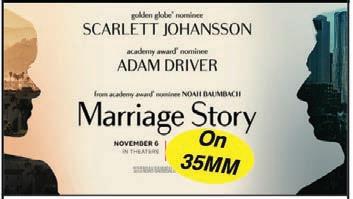
The Return of Navajo Boy Jeff Spitz directed this documentary about the Clys, a Native American family in Monument Valley, Utah, and about John Wayne Cly, adopted by white missionaries as a child and only recently reunited with his clan. Panel with filmmaker and Navajo participants John Wayne Cly and Elsie Mae Begay a er screening. Sat 11/16, 7 PM at Chicago Filmmakers v
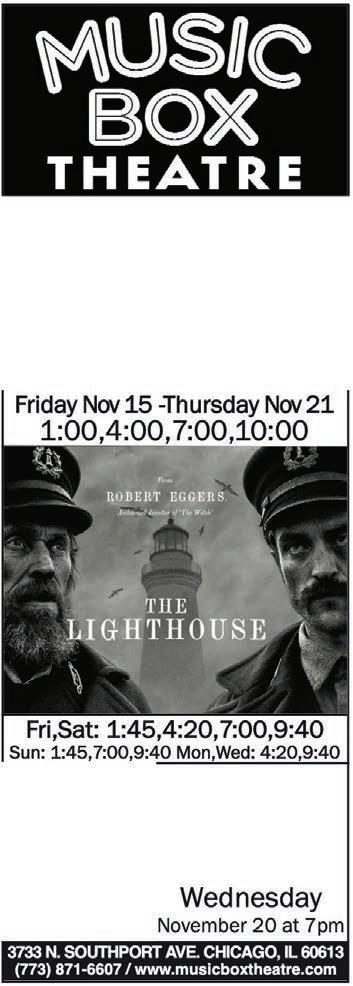
NOVEMBER 14, 2019 - CHICAGO READER 31 FILM
The Kingmaker
Get showtimes and see reviews of everything playing this week at chicagoreader.com/movies
R READER RECOMMENDED b ALL AGES N NEW F
Lithuanian artrock genius Vyto B resurfaces with a cross-generational collaboration
Chicago label Sanzimat International documents the Lithuanian diaspora with three new tapes, including one that features the creator of 70s outsider classic Tricentennial 2076.
By LEOR GALIL
Adecade ago, Edward Anderson of Chicago indie bands the 1900s and Mazes used to trawl the Web for strange music. “It was a very rich era of blogs hosting crazy obscure albums and people uploading tons of stu to YouTube,” he says. On a late-night online expedition in 2010, he stumbled upon a YouTube rip of a song by a musician named Vyto B. “The second I heard it, I was just flabbergasted,” Anderson says. “I couldn’t even believe what I was hearing.”
Anderson had found a selection from Tricentennial 2076, a sci-fi concept album about the future of “New America” that Vyto B wrote, recorded, and released to celebrate the U.S. bicentennial in 1976. The only extant YouTube video of that record uploaded prior to 2011 is the borderline manic “Good and Evil Biorhythms,” where Vyto pairs restless, densely syncopated piano with even more hectic singing—he delivers his lyrics about our uncertain future like a zealous auctioneer, so that I can’t understand all of them even after dozens of listens.

This particular video uses a still image of the Tricentennial 2076 album cover. A stern but baby-faced Vyto is flanked by two background figures who appear to be levitating some sort of ornamental disk above his head—the figure on his left looks like Vyto wearing futuristic garb inspired by ancient Rome, and the one on his right is a mannequin. It was uploaded by user “strugatsky,” who the account’s links suggest lives in Tallinn, Estonia.
Anderson immediately wanted to know more. “I had no idea if he was alive, or from
Chicago, or anything,” he says. “I got to work the next day and just started investigating, investigating, trying to figure out who he was.”
By the time Anderson heard him, Vyto B (short for Vytautas Beleska) had attracted a small international cult following for the music he’d been self-releasing since 1972. Even the most avid record hunters knew only the barest biographical information about him, though. His first release, the compilation First Chips Volume 1, collects a few solo songs and tracks by a handful of short-lived psych and garage bands that he’d played in over the previous few years. Issued on LP by Vyto’s Clay Pigeon label (no one’s sure how many copies were pressed), it’s found its way into the hands of important collectors over the subsequent decades.
Record dealer Paul Major, an evangelist for unusual private-press LPs via his mail-order catalogs Feel the Music and Sound Effects , took a liking to First Chips. In a Sound Effects mailer that appears to be from 1989, he wrote about it fondly: “A most unusual find, and loose as hell.” He was asking $125 for his copy, and these days the compilation commands
an even higher price: a Discogs dealer in Italy has a near mint LP that can be yours for 2,500 euros. Tricentennial 2076 has prompted similar devotion from the collector community. In The Acid Archives, a weighty tome whose second edition (published in 2010) collects reviews of 5,000 hard-to-find rock LPs released between 1965 and 1982, editor Patrick Lundborg wrote that Tricentennial was “destined to become an ‘outsider’ favorite.”
In November 2010, the blog Egg City Radio shared zip files for Tricentennial 2076 and a 1985 Vyto B cassette called Automatic Vaudeville . The post correctly surmised that Vyto was from the Chicago area, but it contained no other details about him. That same year, Anderson discovered not only that Vyto still lived in Chicago but also that he’d never stopped recording and performing. In 2009, Vyto and longtime collaborator John Devlin had launched Monday Club, a weekly series at a coffeehouse near Midway airport called A Place for Us. They performed music as Virtual Party and hosted an open jam session. After connecting with Vyto on Facebook, Anderson and his wife came to Monday Club to meet him
in person.
The two men quickly became friends. “He would come to 1900s shows, hang out, and then he just started coming over to our house,” Anderson says. “He’s got tons of amazing stories. He’s very gregarious and super fun to hang out with. At some point we were like, ‘Hey, we’re hanging out together, should we make some music?’”
In 2012, Anderson and Vyto began a tentative collaboration. For the first year, they met infrequently, but at the end of 2013 they decided to make an album, blocking o regular times to jam and record. This week, they’ll release Gridlock, an eccentric art-rock album credited to Vyto B and Mazes. Anderson is releasing it on cassette through his label, Sanzimat International, named in homage to Vyto’s Clay Pigeon International (also called Clay Pigeon Productions or Clay Pigeon Records).
Sanzimat is putting out Gridlock in conjunction with two other cassettes. The lo-fi psychpop record Era One is the debut of Chicago musician Nicole Baksinskas under the name Nik-Nik, while the eclectic antifolk album Catahua Blanca, allegedly recorded during a
32 CHICAGO READER - NOVEMBER 14, 2019 ll
Vyto B works on Gridlock , his collaborative album with Edward Anderson, at Anderson’s home studio in 2014.
EDWARD ANDERSON
weeklong series of ayahuasca ceremonies in Peru, is the work of a Harvard anthropologist operating under the pseudonym T Stephen. Anderson has designated all three tapes part of a series called the Lithuanian Diaspora, since all the musicians are of Lithuanian descent.





Anderson’s parents didn’t emphasize his Lithuanian heritage while he was growing up in the south suburbs in the 90s. But recently

he’s noticed that he’s long been drawn to other Lithuanian musicians. When he formed the 1900s in 2004, the original lineup included two Chicagoans of Lithuanian descent, multi-instrumentalist Michael Jasinski and violinist Kristina Dutton. Lithuania’s population hovers around three million, but like much of the rest of northeastern Europe, the country spent almost 50 years under Soviet rule—and this drove emigration. According



to a 2018 Economist article, 1.3 million Lithuanians live abroad, and 100,000 of them are in Chicagoland.
Chicago’s large Lithuanian community has played a significant role in the Lithuanian diaspora. Valdas Adamkus of Hinsdale retired from his senior position with the Environmental Protection Agency in 1997, then ran successfully for president of Lithuania in 1998; according to the Tribune , Chicagoans raised $1.25 million for his campaign. Shortly after he left o ce in 2009, at the end of his second term, he gave a phone interview to Lithuanian radio program Margutis, broadcast by WCEV, a multilingual Chicago station that caters to several ethnic groups. The interviewer was Vyto B.
To Chicago’s Lithuanian community, Vyto is hardly the mystery he’s long been to record collectors. According to Robertas Vitas, chairman of the Lithuanian Research and Studies Center, he’s vital to it. Vitas met him about 12 years ago, when Vyto began volunteering for the center, and he’d known about him for much
longer. “He was very prominent as a writer, composer, and musician,” Vitas says. “In his generation, he’s quite well-known.”








Born in Chicago in 1952, Vyto began recording in December 1964, when as a 12-year-old he made a spine-tingling instrumental electronic song called “Time (Part One),” which appears on First Chips. In the five decades since, Vyto has been involved in a lot of different musical projects, and it’s difficult to know the full breadth of his catalog. (His most recent new material came out in the 2010s.) Record collectors have only been able to document a few recordings, a fraction of the material Vyto claims to have released. “He told me crazy stuff that I was never able to substantiate,” says Secret History of Chicago Music creator Steve Krakow. “Like, he moved to France for a long time, he released dozens of cassettes over there, and he was popular over there.” Krakow profiled Vyto in a 2013 installment of his long-running Reader strip, which is one of the few published pieces I’ve dug up (along with a 2014 interview for It’s Psychedelic Baby! Magazine) where Vyto shares his story.

Sadly, I couldn’t get any details from the man himself. Vyto fell ill in 2016, and he



NOVEMBER 14, 2019 - CHICAGO READER 33
Edward Anderson, best known for his roles in the 1900s and Mazes, began collaborating with Vyto B in 2012.
SIRPA K J 1200 W RANDOLPH ST, CHICAGO, IL 60607 | 312.733.WINELIVE MUSIC IN URBAN WINE COUNTRY novnov Cherie Currie & Brie Darling with White Mystery novnov 25 26 + 27 20 Kris Allen 10 Years 1 Night Digable Planets DON’T MISS... UPCOMING SHOWS 11.14 booker t. jones 11.17 Story Jam Brunch FEAT. PETER SAGAL, DAVID PASQUESI, ANTOINE MCKAY, TRACY BAIM & PATTI VASQUEZ 11.18 Corey Smith 11.19 Christine Lavin, John Gorka, Patty Larkin & Cliff Eberhardt ON A WINTER’S NIGHT 11.22+23 heather mcdonald 11.24 enter the haggis 11.29 dwele 12.2 Nat King Cole Celebration 12.4 Jane Monheit 12.7 Chanté Moore 12.8-10 los lobos 11.16 WATCH WHAT CRAPPENS LIVE PODCAST 11.21 DON MCLEAN 11.24 CHICAGO PHILHARMONIC BRUNCH SERIES 11.30-12.1 BODEANS 12.3 WHINE DOWN WITH JANA KRAMER 12.11 DAN RODRIGUEZ 12.12 KEVIN ROSS 12.13 RODRIGUEZ OF SEARCHING FOR SUGARMAN 12.15 JANE LYNCH - SWINGIN’ LITTLE CHRISTMAS 12.16 JUMP, LITTLE CHILDREN WITH HULA HI-FI 12.17 JAKE CLEMONS 12.18 STEPHEN KELLOGG WITH TONY LUCCA 12.19-20 MUSIQ SOULCHILD 12.21 LEVI KREIS - HOME FOR THE HOLIDAYS 12.22 CHICAGO PHILHARMONIC BRUNCH SERIES 12.21-23 MICHAEL MCDERMOTT 12.25 CHRISTMAS FOR THE JEWS 12.26-27 SHEMEKIA COPELAND WITH KEVIN BURT 17 Jimmy Webb with robin spielberg
declined to talk to me. No one I spoke with would share details about his condition on the record. I communicated with Vyto through Anderson, who passed along a few brief messages. “He was just like, ‘It’s all on the Internet—my life that you need to know is findable on the Internet,’” Anderson says. “He said, ‘I send my love.’”
As a child, Vyto studied composition under Vladas Jakubėnas, a Lithuanian expat who’d been a pupil of Austrian composer Franz Schreker at the Berlin University of the Arts in the late 1920s and early 1930s. When British bands brought their flavor of rock to the States in the 60s, Vyto got hooked and began playing in several bands, including Grand Fuck (a ri on Grand Funk Railroad). That group supplied First Chips with three primordial art-rock songs, including the florid ripper “Fire Mountain.” Elsewhere on the compilation, on the hard-psych jam “Mind and Soul,” Vyto teamed up with bassist Arvy Tumosa and drummer Denny Murray—both of whom also played in Mercury-signed rock act Lincoln Park Zoo. The eight-and-a-half-minute
song was recorded live at a high school dance in Tinley Park.
Multi-instrumentalist John Devlin met Vyto in early 1973, shortly after the release of First Chips. Devlin had been attending a Friday jam session in the basement of Chicago Lawn Presbyterian Church, and one night Vyto dropped in to play—and he brought copies of the LP, which he was selling for $2. “I said, ‘Hey, do you have any copies that I could borrow, and if you’re coming back next week I’ll give it back?’” Devlin says. “He lent me a copy to audition the album, and I listened to it a few times and decided, you know, there’s something about this record.”
Devlin bought the LP, and continued jamming with Vyto even after the churchbasement sessions ended a few months later. In late 1973, Devlin played his first gig with Vyto at a dance held at the Lithuanian Youth Center in Gage Park (the building would later house the Lithuanian Research and Studies Center as well). “That was one of my moments that I felt like I’d arrived—to me, it was an incredible gig,” Devlin says. He performed with Vyto on and off during the ensuing decades.
“We actually played a lot of weddings—I al-
ways took a lot of pride in what we did, ’cause while we were never a regular band, we were able to play well together,” Devlin says. “We did a lot of jamming, even at receptions, after the older people would leave. We’d rock the place.”
Vyto kept starting new bands, sometimes with Devlin and sometimes without him. In the mid-70s, they launched the Martian Plan, which Devlin describes as post-new wave. In the late 70s, they formed Angelica, which had a song Devlin claims sounded like Double’s 1985 soft-rock single “Captain of Her Heart.” Virtual Party, whose name Vyto would later use for his Monday-night gigs with Devlin at A Place for Us, was originally a synthy experimental pop duo with saxophonist Scott Carlton in the 90s. The project that stuck around longest was the Band That Never Made It, an initially Devlin-less project that Vyto started in 1979. That year, Clay Pigeon released the Vyto B seven-inch “The Band That Never Made It” b/w “The Most Beautiful Tribe of Dolls.” (The B side shares a name with a film Vyto says he released in 1981, though the only evidence of its existence I’ve found is a trailer on his YouTube page.)
Devlin says the original lineup of the Band That Never Made It petered out after about a year and a half. In 1981, Vyto recycled the name for a trio that did include Devlin, who soon recruited a drummer named Rick Trankle—he came aboard unrehearsed for a paid gig at a south-side grade school reunion. Between blocks of 60s classics, the three of them played Vyto originals, which quickly made a fan of Trankle. “They caught my ear, they were just
so pleasing,” Trankle says. “It was his, but it had that familiar sound and feel to it. When you hear music like that, you just naturally are drawn to it for whatever reason.”
Within a year, the trio had landed a gig at Tuts in Lakeview, at the time one of the city’s favorite rock clubs—but that was as close as the trio (or Vyto) got to mainstream success or fame. Devlin says Angelica attracted some interest from MCA imprint Infinity, though the label folded before anything solidified. In the early 70s, Vyto had run into famous Chicago radio personality Larry Lujack and passed along some of his music, but other than some encouraging words, that didn’t lead anywhere either. “Larry Lujack actually called him,” Devlin says. “He was saying, ‘Man, Vyto, that song’s a bitch!’” In the mid-80s, Vyto took o for Paris, returning to Chicago only sporadically and only sometimes playing with Devlin or Trankle when he did. It stayed that way for years.


Anderson, 41, grew up in Palos Park. His maternal grandfather was Lithuanian.
“I’m more than 25 percent like him,” Anderson says. “That’s the part of my heritage that intrigues me and I feel like I have the most relationship to.” He never enrolled in any Lithuanian cultural heritage class or attended a Lithuanian youth center, but as he got deeper into making music, he kept encountering like-minded artists of Lithuanian descent.
In sixth grade, Anderson started a band called R.O.M.C. (he’d rather not say what it stood for) with a buddy who had a drum machine and recording equipment. “Our idea
34 CHICAGO READER - NOVEMBER 14, 2019 ll
This week Anderson’s label Sanzimat International releases three cassettes in its Lithuanian Diaspora series: Era One by Nik-Nik (aka Nicole Baksinskas), Catahua Blanca by T Stephen, and Gridlock by Vyto B and Mazes. COURTESY SANZIMAT INTERNATIONAL
continued from 33
wouldn’t be, ‘Hey, let’s make a song today,’” he says. “We’d be like, ‘Let’s make an album today.’ We’d open the attic and make an album. Every time we hung out, we’d make albums and albums.” At the time, the biggest band Anderson knew in the south-suburban teen scene was Dyslexic Apaches, and front man Bruce Lamont (now of Bloodiest and Yakuza) took a liking to Anderson’s group. He played one of their songs on a college radio station—Anderson thinks it was probably WXAV 88.3 FM at Saint Xavier University. “It was, like, the greatest moment of my life,” Anderson says. “I still see Bruce. I’m always like, ‘Thank you so much for championing my music when I was in sixth grade.’”
In high school, Anderson played in an experimental trio called Minotaurs of P with Michael Jasinski and Tim Minnick, both of whom would become part of the first 1900s lineup in 2004. The 1900s made their live debut in September 2006 and soon signed with downstate indie Parasol; the following year they released their debut album, Cold & Kind, and performed at Lollapalooza. By 2009, Anderson had put out another record on Parasol, this one by his side project Mazes. Both were lush
and genteel, characteristic of indie rock at the time.

Anderson still tinkers with material for both bands, but not long after the second 1900s album, 2010’s Return of the Century, he basically stopped performing live. The following year, while working on the Mazes record Mazes Blazes , he decided to start a label of his own to release it. He’d already met Vyto by then, and he wanted to reissue his friend’s back catalog too.
Vyto B reissues on Sanzimat have yet to materialize, in part because Vyto has been more interested in his new music. But since launching his label in 2012, Anderson has built a catalog that includes enough archival material for such releases to make sense. Within its first couple years, Sanzimat had put out two such records: Coyote: Archives Vol. 1, a compilation of puckish home recordings made by artist and prankster Derek Erdman between 1994 and 2004, and Happy Alchemy, a collection of Nicole Baksinskas’s 2004 bedroom-pop experiments with an Omnichord.
Anderson connected with Baksinskas in 2012, after digging through music files on the computer of Mazes member Charles J
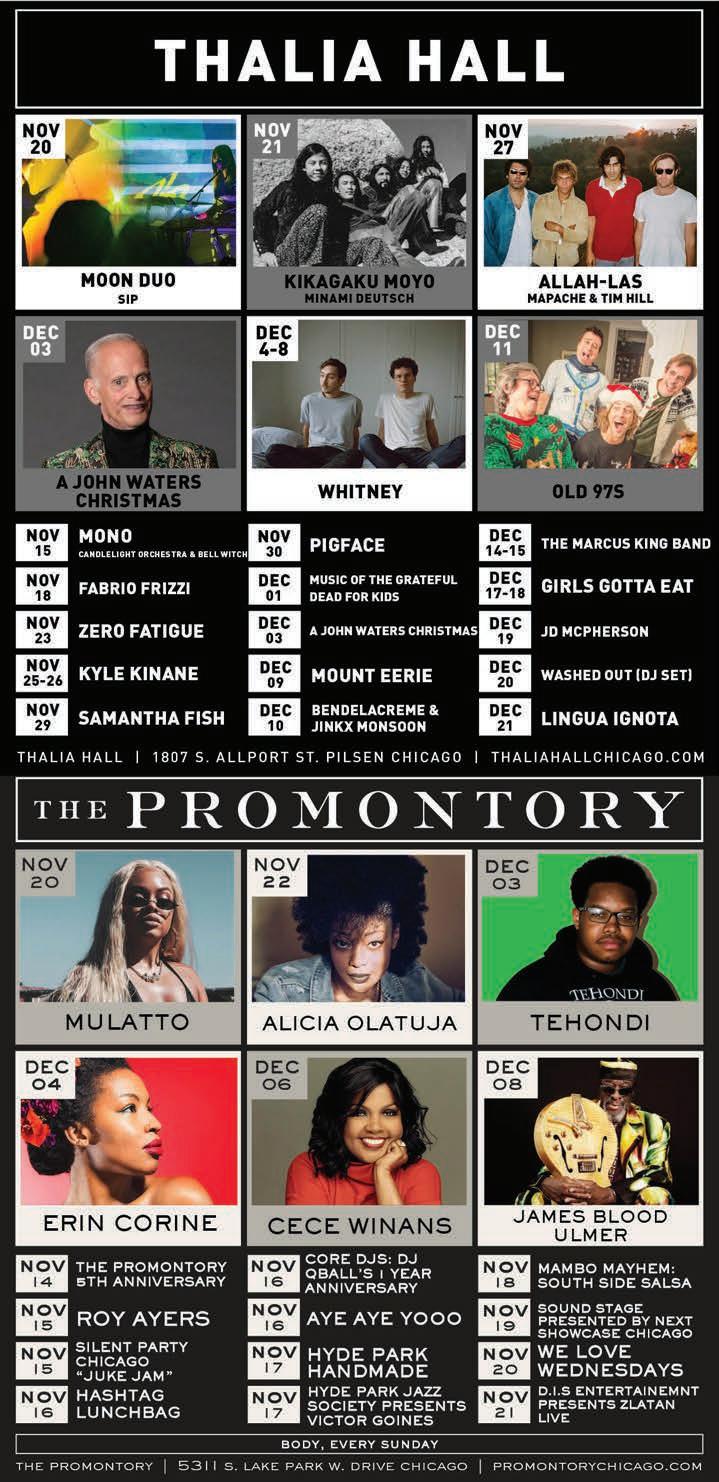
NOVEMBER 14, 2019 - CHICAGO READER 35
d’Autremont. D’Autremont had run a home studio, and Baksinskas had recorded there. “We wrote some songs, and I kind of forgot about them for a while—for years, really,” Baksinskas says. Material that Anderson found that night is included on the new Era One cassette. “It’s pretty cool when someone else discovers your stu and is excited about it,” Baksinskas says. “And wants to release it.”
In 1920, a Lithuanian musicologist, composer, and professor named Juozas Žilevičius moved back home from Russia with a few boxes of materials and established a Lithuanian musicological archive. In 1929, he relocat-
ed to New Jersey, bringing some of his rarest materials. Intending to return to Lithuania, he left the rest with a friend in the town of Gargždai, but World War II intervened. Though everything Žilevičius hadn’t brought to the States was destroyed, he rebuilt his collection—and then some. By 1960, when he moved the archive to Chicago, it weighed about 3,000 pounds. Today the Žilevičius-Kreivėnas Musicology Archive is in the care of the Lithuanian Research and Studies Center, which recently moved to suburban Lemont. Chairman Robertas Vitas says it’s the largest such collection outside Lithuania.
Vyto began working with the musicology archive as a volunteer in the late 2000s. He’d
help catalog reel-to-reel recordings, letters, films, vinyl, and other documents, and show visiting researchers around. “He was perfect for the musicology archive,” Vitas says. “He’s been involved in the Chicago music scene for many, many years—but also the Lithuanian music scene. Those Lithuanian American musicians, many of them he knew, he worked with, he collaborated with, and played events with—so he had that kind of content knowledge that is very rare.”
Vitas says the archive likely contains some of Vyto’s work too—most of its contents aren’t yet digitally indexed, so it’s impossible to be sure without an exhaustive manual search. Anderson says Vyto hasn’t done a great job maintaining an archive of his own, so the Žilevičius- Kreivėnas collection might eventually let the public hear music of Vyto’s that isn’t available any other way. “I got some of it, but there’s more,” Anderson says. “I don’t know who has it, or if it still exists—I have no idea.”
Vyto frequently recorded rehearsals and live sets, and Devlin has some reel-to-reel tapes and cassettes of his work with Vyto. So does Trankle, who shared some digitized versions with me—I heard snippets of them playing Tuts in 1981, where they injected their fierce, borderline feral set with refined glam.

Anderson isn’t the only person who’s hoped to reissue Vyto’s material. Moniker Records founder Robert Manis, who helped Drag City reissue recordings by Detroit protopunk band Death, has had the itch since discovering Tricentennial 2076 a decade ago. “I just thought this guy was Elton John on acid—it was so wild, and so flamboyant in a way,” Manis says. “I haven’t heard anything like it—even to this day, it’s so unique.”
Krakow thinks Vyto might not know where he’s stored some of his masters—an obvious problem for any authorized reissue. Anderson says a friend of Vyto’s has uploaded First Chips Volume 1 , Tricentennial 2076 , and the 1994 full-length Virtual Party to Spotify over the past year, but he doesn’t know if Vyto gave his permission.
Manis talked to Vyto in 2012 about rereleasing some of his old work, only to discover that Vyto didn’t share his enthusiasm for the project. “I tried hard to persuade him to get Tricentennial 2076 to be reissued, because I think it’s a phenomenal piece of work, and I know people would love it—just getting it out on a label like Drag City or Numero would be really special,” Manis says. “But he was so excited about the work he was doing at the moment. He’s an artist, so he’s always pushing things forward, doing things different. He
didn’t really want to revisit his old work.”
In the early 2010s, Vyto picked up where he’d left off in the 80s with the Band That Never Made It, again as a trio with Devlin and Trankle. They played a few gigs, mostly at the behest of younger fans eager to spread the word about Vyto’s history as an underground legend: Manis booked them for a Record Store Day set at Permanent in 2012, and Krakow tapped them for a summer version of his annual Psych Fest at the Hideout in 2015. Before Vyto fell ill in 2016, he and Devlin would travel to Trankle’s northwest-side home and play in the basement every week. “It was a joy for me,” Trankle says. “It almost fulfilled that dream of ‘We’re playing every week, we’re putting on a show.’ Those rehearsals were performance rehearsals—they weren’t ‘Let’s jam.’”
Vyto also kept recording with Anderson throughout this period. “Sometimes we would get something new started,” Anderson says. “Sometimes we would just mess with old songs, do crazy overdubs and stu .” Both of them are meticulous about refining their work, Anderson explains, which is partly why they hadn’t released anything prior to Gridlock. It wasn’t till Vyto gave Anderson the thumbs-up last year that Sanzimat sketched out a plan to release the freewheeling art-rock they’d cooked up together.
The two musicians developed a casual, well-balanced division of labor on the project—both sang, wrote lyrics, programmed drums, and played bass, drums, keyboards, and guitar. During the recording and production process, Anderson and Vyto would have long conversations about their Lithuanian heritage and the community they shared.
“It was maybe one of the main topics of our conversations, for years,” Anderson says. On the closing track of Gridlock, the dreamy “Celebrate (Visions of Doom),” layered overdubs of Vyto speaking in Lithuanian swirl through a dark, anxious interlude—Anderson says he’s explaining an avant-garde Lithuanian opera that was staged in Chicago in the 70s.
“Celebrate” is a “mini opera” about Russia’s attempts to overtake Lithuania, Anderson says, but despite its double-edged title and its chilly, anxious verses, the song manages a sardonic sort of hopefulness in its soaring choruses. Just before it fades out, Vyto plays a slow-building guitar solo that combines a meticulous, almost pastoral melody with a scorched psychedelic tone. “It was one of the best guitar solos I’ve ever heard,” Anderson says. “That was the last thing we recorded.” v
@imLeor
36 CHICAGO READER - NOVEMBER 14, 2019 ll
continued from 35
OF
WHENEVER AN OUTSIDER STYLE of rock music finds crossover success, it’s inevitably plagued with a surge of mediocre newcomers, but one band to rise above that fray in recent years is Swedish trio Monolord. The Gothenburg group formed in 2013 and released two promising albums on Rising Easy before making their Relapse debut with 2017’s Rust as perfect a traditional stoner-metal album as anyone has put out this decade. On their brand-new No Comfort, Monolord have stripped back some of their characteristic fuzz to highlight their songwriting prowess and the sheer magnitude of their sound. Though the album kicks o with an all-too-familiar Electric Wizard-flavored opening track, “The Bastard Son,” the group’s rehashing of the basics stops there. “The Last Leaf” combines atmospheric grooves with despondent lyrics about caring too much in an indifferent world. That bleakness becomes outright apathy in “Larvae,” culminating with ferocious, bottom-heavy chugging. “Skywards” barrels through throbbing, lumbering ri s before lifting o with guitar lines worthy of Thin Lizzy’s most victorious march—and even more striking is its stark, heart-rending closing passage. As with any great band in this style, the most important aspect is arguably the tone of the guitar and bass, and in this regard, a ticket to see Monolord in action is worth the price just to immerse yourself in the eye of their sonic storm.
 —JAMIE LUDWIG
—JAMIE LUDWIG
THURSDAY14
ASAP Ferg Murda Beatz and MadeinTYO open. 6:30 PM, House of Blues, 329 N. Dearborn, $40$133. b

Most of the world was introduced to ASAP Ferg by his verse on “Kissin’ Pink,” off ASAP Rocky’s breakthrough 2011 mixtape, Live. Love. ASAP . It was clear that Ferg had something special right from the jump: in the hypnotic, psychedelic haze of the record, his stylish, smooth, soulful rap-singing stood out. Each member of the ASAP Mob collective has a larger-than-life persona, and though Rocky has since moved on to actual superstardom, Ferg’s five official releases have proved him to be the crew’s biggest talent. Combining 90s gangsta-rap aggression with the effortless spirituality of Bone Thugs, Ferg moves from hilarious, in-your-face rhymes to a near-gospel croon. He’s on top of his game, and he gives us a taste of his greatness on the August album Floor Seats: its nine tracks slap and snap, and when you’re wrapped up in Ferg’s world, it’s impossible not to have a good time. —LUCA CIMARUSTI
Clan of Xymox Bellwether Syndicate opens. Thalia Hall, 1807 S. Allport, $25-$30. 17+
Dutch outfit Clan of Xymox swirled and swept their dramatic, electronics-saturated way onto the international stage in the early 80s as part of the stable of artists on 4AD, he label that helped set the era’s standard for quality postpunk. Originally a fourpiece led by a trio of songwriters—Ronny Moorings, Anka Wolbert, and Pieter Nooten—the band rapidly became a bit of a soap opera, with various parties wrestling for control. By the early 90s, Moorings was the last original member standing, and he’s
been steering the ship ever since, touring as Xymox for a few years before reverting to the full name in 1997. Clan of Xymox’s latest studio album, 2017’s Days of Black, carries on with the dispirited, romantic, dancing-alone-in-a-crowded-club vibe that the band helped pioneer, its songs weaving together vocal and instrumental styles from synth pop, UK acid house, light industrial, and post-Joy Division gothic rock. There’s always an audience for bands that ritualize and dignify cathartic sadness, and Clan of Xymox know how to serve it up—one of several reasons they remain a staple of European music festivals to this day. For their current tour (their second U.S. jaunt of the year but the first to hit Chicago), they’re promoting a deluxe vinyl reissue of their 1989 commercial breakthrough, Twist of Shadows (Pylon). In my opinion, the best place to start exploring their catalog is the 1985 self-titled album and its 1986 follow-up, Medusa, but Twist of Shadows is nonetheless a haunting, ghostly snapshot of a place and time, and deserving of a new audience.
—MONICA KENDRICK
Angel Olsen Vagabon opens. 7:30 PM, Riviera Theatre, 4746 N. Racine, $32. 18+
Angel Olsen has a voice that can command an entire theater and the songwriting chops to match— even playing solo with just an acoustic guitar, she can transfix a sold-out house. On her recent fourth album, All Mirrors (Jagjaguwar), Olsen involved a small orchestra and added synthesizers to her instrumentation, choices that enrich and amplify the deft, emotive gestures in her music—and that convinced me she’ll be headlining halls even bigger than the Riv sooner than later. The glittering synth melody that makes up the body of “Too Easy” doesn’t feel out of step with any of the earthy, guitar-based tunes in her previous catalog—like the rest of the album, it’s a natural progression of her sound. As she’s proved many times already, Olsen can twist your guts with the subtlest shi of a melody; when a sea of strings rises up to support her deep, gentle singing on “Tonight,” her hushed voice sounds like a magic spell for mystifying entire countries. —LEOR GALIL
Ken Vandermark’s Momentum 5 9 PM (two sets), Elastic, 3429 W. Diversey, second floor, $15. b
This autumn marks 30 years since Ken Vandermark moved to Chicago. The reedist plays tenor and baritone saxophones as well as B-flat and bass clarinets, and his staggering output—he’s put out six releases this year alone, one of them a five-disc set—can be divided and analyzed according to any number of metrics, including where he spent most of his time while producing the material. Early on, he mostly played in Chicago, gigging frequently around town in various ensembles. A er the MacArthur Foundation awarded him a grant in 1999, he spent the funds trying to build an infrastructure for touring improvisers in the States. By the mid-00s, the money had run out, so he shi ed his focus to Europe—and for the next decade, he was out of town so much that it was easy to forget he still lived here. Vandermark is still filling up his passport with internation-
NOVEMBER 14, 2019 - CHICAGO READER 37
MONOLORD, BLACKWATER HOLYLIGHT, CANYON OF THE SKULL Wed 11/20, 7 PM, Reggies’ Rock Club, 2105 S. State, $18, $16 in advance. 17+
PICK
THE WEEK
Monolord prove themselves one of the decade’s best stoner-metal bands with No Comfort
Recommended and notable shows and critics’ insights for the week of November 14 J MUSIC
ESTER SEGGARA
b ALL AGES F
ASAP Ferg RENELL MEDRANO
MUSIC


continued from
al stamps, but in the past five years he’s shown a renewed commitment to working with musicians based in North America, and he’s documented these projects with a series of releases collectively titled Momentum. The five-CD box set Momentum 4, released this summer by Vandermark’s Audiographic label, drills deep into his work as an improviser, displaying his ample resources in that arena. It compiles duets he made with pianist Kris Davis, electronic musician Ikue Mori, bassist William Parker, and percussionists Hamid Drake and Paul Lytton (the latter is English, but they recorded in Chicago). Depending on context and company, Vandermark can swing ferociously, shi and evolve his lines with dizzying speed, and generate musical forms that are both abstract and bracingly intense. The newest project, which debuts Thursday night at Elastic Arts, advances Vandermark’s interest in mixed materials. It’s called Momentum 5: Stammer Triptych, a name that applies to the handpicked ensemble as well as to the piece it will approach from three different angles. The musicians are a double quartet that includes Katinka Kleijn and Nick Macri on low strings; Tim Barnes and Claire Rousay on percussion; Damon Locks and Lou Mallozzi on recordings, samples, and electronics; and Vandermark and Mars Williams on reeds. Their stylistic breadth allows Vandermark to combine classical structures, freejazz textures, electronic and acoustic rhythms, and manipulated text-based material. The instrumentalists will play the piece three times over the course of the night, swapping roles from one iteration to the next, while Vandermark revises the composition’s sequence of events like a film editor. Visual artist Kim Alpert will use two screens to simultaneously project prepared video and real-time manipulations of the video content. —BILL MEYER
FRIDAY15
FKA Twigs 7:30 PM, Riviera Theatre, 4746 N. Racine, sold out, all-ages


FKA Twigs is a singular force in ethereal, otherworldly trip-hop and avant-pop. Born Tahliah Debrett Barnett in Gloucestershire, England, the British singer, songwriter, dancer, producer, and director seems nearly unparalleled in her creative drive—and that’s illustrated by her current tour. Named after the new Magdalene (Young Turks), her second LP and first in five years, the multidisciplinary experience finds inspiration in Gesamtkunstwerk , a German concept that means “total work of art” or “synthesis of the arts.” Twigs is already known for her beautifully choreographed live shows, full of dancers and elaborate costumes; with the Magdalene tour, she adds fantastical set designs, martial arts, sword dancing, pole dancing, artsy lighting, and more. Conversely, the new album strips back the eerie electronic production that helped establish Twigs’s aesthetic. Strange, alien sounds and warbling effects remain, but here her incredible soprano is front and center, accompanied by beautiful piano passages and orchestral flourishes. And though she established a somber, melancholy tone with her early material, Magdalene takes that further—it’s downright sorrowful at times, a feeling epitomized by “Home With You” and album closer “Cellophane.” Over the sparse piano notes of the latter, Twigs despairingly and delicately asks, “Why don’t I do it for you? / Why won’t you do it for me? / When all I do is for you?” And when she sings “They want to see us alone / They want to see us apart,” it’s hard not to wonder if the song is directly informed by her high-profile relationships with

38 CHICAGO READER - NOVEMBER 14, 2019 ll
Find more music listings at chicagoreader.com/soundboard
37
Angel Olsen
CAMERON
MCCOOL
SMARTBARCHICAGO.COM 3730 N CLARK ST | 21+ 3730 N. CLARK ST METROCHICAGO.COM METROCHICAGO@ TICKETS AVAILABLE VIA METRO + SMARTBAR WEBSITES + METRO BOX OFFICE. NO SERVICE FEES AT BOX OFFICE! DILLINGER FOUR & MODERN LIFE IS WAR ARMS ALOFT C.H.E.W. THU NOV 21 LA DISPUTE TOUCHÉ AMORÉ EMPATH MON NOV 18 METRO/SMARTBAR & RED BULL MUSIC FESTIVAL PRESENT GRAMAPHONE 50 STEVE “SILK” HURLEY DERRICK CARTER SUN NOV 17 NEON INDIAN LOU REBECCA SAT NOV 23
Robert Pattinson and Shia LeBeouf. It’s an especially vulnerable way to end an album, and it points to Twigs’s self-reinvention while cementing her as a generational talent. —SCOTT MORROW
Torche Eye Flys and Rlyr open. 8:30 PM, Empty Bottle, 1035 N. Western, $18, $16 in advance. 21+
Miami band Torche have always been like heavy metal’s cotton candy, and their recent fi h album, July’s Admission (Relapse), is their most delicious yet. Since rising from the ashes of stoner-rock group Floor in 2004, Torche have specialized in what they call “thunder pop”—a hard-hitting, wall-ofsound brand of sludgy doom metal that’s topped off with swing-for-the-cheap seats melodic hooks. It’s an infectious formula, and when they covered three classic Guided by Voices tunes on a 2011 split with Part Chimp, they further illustrated their knack for transplanting undeniable pop hooks into the context of a heavy metal song. Admission is the band’s best work, and puts all their best elements on display: bombastic tones, repetitive cave-man riffage, pummeling rhythms, and the legendary Torche “bomb string,” downtuned so far it practically hangs off the guitar in order to create a deep, crumbly, explosively heavy sound. Every song is smooth, catchy, and perfectly cra ed, and the album is easily the one I’ve listened to more than any other this year. Live, Torche are locked-in and loud as hell, as befits one of the modern greats. Opening this show are new Thrill Jockey signees Eye Flys—an angry, disgusting band who proudly worship at the altar of the Melvins and Unsane. —LUCA CIMARUSTI
SUNDAY17

Not Lovely Davis, Ben Burden, and DJ Frail open. 8:30 PM, Empty Bottle, 1035 N. Western, $8. 21+
Genre-bending jazz-rap troupe Not Lovely started almost on a dare. In summer 2015, vocalist and producer Jack Clements remixed Wilco’s “EKG,” rapped over it, and uploaded his version to the Soundcloud account of Auburn Hills, his studio hiphop project with rapper-producer Alex Singleton— aka Why? Records cofounder Joshua Virtue. “EKG” eventually earned Clements and Virtue an invite to the Wilco lo , and when Jeff Tweedy asked the duo if they had a band, they decided to put one together. Not Lovely’s core quintet also includes guitarist Michael Queenan, bassist Hannah Fidler, and drummer and synth-player Taylor Stevenson, but they frequently add to their ranks to fill out their sound—their new debut full-length, Matterlightblooming (Not Labely), includes contributions from keyboardist Alex Murphy, bassist Simon Ciaccio, saxophonist Dustin Laurenzi, and ten other auxiliary musicians mostly playing trumpet, trombone, or saxophone. The result sounds like the kind of album defunct Chicago teen-rock band Kids These Days wanted to make. Not Lovely use jazz as a base for their radical explorations of hip-hop, pop, prog, soul, and metal; on “Ultraviolent Carnation,” they slowly transform a mellow, airy jazz melody into an anxious, throbbing rock rager whose crescendo peaks when Stevenson’s machine-gun double kick drum meshes with Clements’s rapid rapping. The concepts don’t always gel, but Not Lovely work through even J
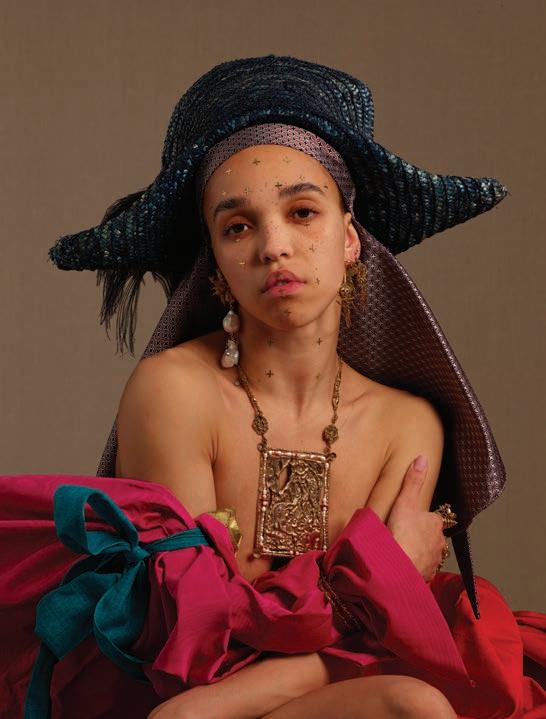
NOVEMBER 14, 2019 - CHICAGO READER 39
FKA Twigs COURTESY THE ARTIST
MUSIC Music, Art 24 7 lumpenradio.com coprosperity.org Shows, Events WLPN LP 105.5 FM ON AIR
FEBRUARY23.....MIKEFELTEN
FEBRUARY24.....
MURPHYTHOMPSON9:30PM
FEBRUARY25.....WHOLESOMERADIODJNIGHT

FEBRUARY26.....RCBIG
FEBRUARY28.....PETERCASANOVA
MARCH1............SMILIN’
MARCH2............ICE
MUSIC

continued from 39 their knottiest ideas with enough conviction to charm. —LEOR GALIL

Caterina Barbieri 8 PM, Preston Bradley Hall, Chicago Cultural Center, 78 E. Washington. bF

The cover of Caterina Barbieri’s 2019 album Ecstatic Computation (Editions Mego) is composed of two eyes digitally layered over a photo of grayish fog. Its retrofuturistic aura is an apt representation of the Italian composer’s music and what she strives to accomplish through it. Drawing largely upon the works of German musicians such as Klaus Schulze and Tangerine Dream, Barbieri uses modular synthesizers to explore perception and memory. Her contemporary take on progressive electronic music sometimes resembles that of local ambient musician Steve Hauschildt. The buoyant synth arpeggios of “Fantas” are suffused with drama, while “Spine of Desire” creates emotional tension with prickly melodies and a spaciousness that’s reminiscent of the pointillistic trance pieces pioneered by Italian producer Lorenzo Senni. Though Barbieri’s music can be inviting, some of her soundscapes burst with chaos: on “Closest Approach to Your Orbit,” a whirlwind of cacophonous sounds swirls around resplendent synth melodies. Ultimately, Barbieri’s goal with Ecstatic Computation seems to be to induce a state of ecstasy and contemplation. Her pattern-based synth work is hypnotic, and her thoughtful approach to sound design on tracks such as “Arrows of Time” (primarily composed of processed vocals) is enthralling. This performance at the Chicago Cultural Center’s Preston Bradley Hall will be her first time using multichannel audio, which will allow for a more layered and immersive experience—and her mesmerizing music should be further enhanced by the room’s impressive natural reverb. —JOSHUA MINSOO KIM
MONDAY18
Health & Beauty, J.R. Bohannon 8:30 PM, Empty Bottle, 1035 N. Western, 21+ F

I first met Brooklynite J.R. Bohannon when he was working as a booking agent for underground bands and cult artists, so I was surprised when he le that business to focus on his own music. Born in Louisville, Kentucky, Bohannon moved to New York in 2009 to soak up the avant-garde music scene (in an interview with Premier Guitar he mentions Sonny Sharrock and Acid Mothers Temple as favorite bands). In 2015 he released the debut album of his ambient project Ancient Ocean, but the earthy bluegrass sounds of his southern upbringing remained in his consciousness. In 2017 Bohannon finally began serving up solo music that reflected that duality, putting out an EP called Recôncavo (Phantom Limb) that reflected his background in classical guitar and his love of Brazilian music and the Takoma sound popularized by Leo Kottke and John Fahey. On the first LP under his own name, the brand-new Dusk (Figureeight), Bohannon’s influences blossom into reflective, post-American Primitive acoustic-guitar flights, with occasional contribu-
tions from jazz bassist Luke Stewart and drummer Greg Fox. Bohannon’s Bandcamp page describes the swirling track “The Sorcerer’s Hand” as “a Black Sabbath ballad performed by Appalachian musicians.” But introspectively lovely songs such as “A Continuous Harmony” and “Paradise Kentucky” transcend any simple comparisons (though to digress, Sabbath’s string-soaked instrumental “Laguna Sunrise” has on occasion almost made me weep). Headlining this show is local musician Brian Sulpizio, who’s been performing as Health & Beauty for more than 15 years. He’s used the name for various band lineups that serve his ragged yet tuneful vision, which encompasses dry indie-pop ruminations, Leonard Cohen-influenced melodies, and incendiary off-the-rails Crazy Horse-style rave-ups (copiloted by Sulpizio’s longtime collaborator, rowdy bassist Bill Satek of Mines) that showcase his blazing guitar prowess. (Sulpizio has o en backed Ryley Walker, who’s no guitar slouch himself.) This show celebrates H&B’s new seventh LP (and second for Wichita Recordings), Shame Engine/Blood Pleasure, out on November 22 and available for purchase at the show. Though I’ve yet to hear the entire album, the horns, background singers, and swirly production of the first single, “Rat Shack,” hint that it could be the project’s most cohesive and polished recording to date. It’ll be great to hear Bohannon and Health & Beauty back-to-back at this show—two forward-thinking but tradition-rooted acts, both at the top of their game.
—STEVE KRAKOW

TUESDAY19
Jack LArsen 7:30 PM, Schubas, 3159 N. Southport, $12, $10 in advance. b

About six months before rapper-producer Kevin Abstract launched wildly popular hip-hop boy band Brockhampton in early 2015, he dropped his

40 CHICAGO READER - NOVEMBER 14, 2019 ll
Caterina Barbieri
JIM NEDD JUST ADDED • ON SALE THIS FRIDAY! 2/21 James McMurtry FOR TICKETS, VISIT OLDTOWNSCHOOL.ORG 11/22 Killer Ballads: Celebrating Murder Ballads and other Songs of Death 11/20 Nella 11/27 Old Town School of Folk Music and Cenzontles present The Cenzontles Indigenous Celebration ACROSS THE STREET IN SZOLD HALL 4545 N LINCOLN AVENUE, CHICAGO IL WORLD MUSIC WEDNESDAY SERIES FREE WEEKLY CONCERTS, LINCOLN SQUARE OLDTOWNSCHOOL.ORG 4544 N LINCOLN AVENUE, CHICAGO IL OLDTOWNSCHOOL.ORG • 773.728.6000 THURSDAY, NOVEMBER 14 10PM Rising Appalachia FRIDAY, NOVEMBER 15 8PM Nellie McKay In Szold Hall SATURDAY, NOVEMBER 16 8PM Frances Luke Accord / Joybird In Szold Hall WEDNESDAY, NOVEMBER 20 8PM Son Little with special guest Christopher Paul Stelling SATURDAY, NOVEMBER 23 8PM Ian Maksin SATURDAY, NOVEMBER 30 5 & 8PM Irish Christmas in America SUNDAY, DECEMBER 1 3:30PM The Nut Tapper Christmas Show Family show FRIDAY, DECEMBER 6 7PM The Bad Plus SATURDAY, DECEMBER 7 8PM Over the Rhine FRIDAY, DECEMBER 20 8PM Bettye LaVette 1800 W. DIVISION (773)486-9862 EVERYTUESDAY (EXCEPT2ND) AT 8PM OPENMICHOSTEDBYJIMIJONAMERICA Comeenjoyoneof Chicago’sfinestbeergardens! JANUARY11..................FLABBYHOFFMANSHOW8PM JANUARY12..................AMERICANDRAFT JANUARY13..................DJSKIDLICIOUS JANUARY14.................. TONYDO ROSARIOGROUP JANUARY17.................. JAMIE WAGNER&FRIENDS JANUARY18..................MIKEFELTON JANUARY19..................SITUATION DAVID MAXLIELLIAMANNA JANUARY20..................FIRST WARDPROBLEMS JANUARY21.................. TONYDO ROSARIOGROUP JANUARY22..................RCBIG BAND7PM JANUARY24..................PETERCASONOVA QUARTET JANUARY25..................THEWICK JANUARY26..................THEHEPKATS SKIPPIN’ ROCK JANUARY27..................THESTRAY BOLTS JANUARY28..................WHOLESOMERADIODJNIGHT Est.1954 Celebratingover toChicago! 61yearsofservice
DARK ROOMMEN WHITEWOLFSONICPRINCESS MOJO49
BAND7PM
QUARTET8PM
BOBBYANDTHECLEMTONES
BOXANDBIGHOUSE MARCH3............CHIDITARODAND TARRINGTON10PM MARCH7............ JAMIE WAGNER&FRIENDS SEPTEMBER20..... DAVIDQUINN SEPTEMBER21.....WAGNER&MORSE SEPTEMBER22.....THE DYNAMOS SEPTEMBER23....WHOLESOMERADIODJNIGHT
MIKEFELTEN THERONANDRACHELSHOW SEPTEMBER24.....RCBIGBAND7PM BIRDGANGS9:30PM TITTYCITTY DUDESAME SEPTEMBER26.....PETERCASANOVAQUARTET SEPTEMBER27.....DORIAN TAJ SEPTEMBER28..... TOURS BULLYPULPIT SEPTEMBER29.....SOMEBODY’SSINS FEATURINGJOELANASA SEPTEMBER30.....OFFTHEVINE4:30PM NUCLEARJAZZQUARKTET7:30PM Est.1954 Celebratingover 65yearsofservice toChicago! EVERYTUESDAY (EXCEPT2ND) AT 8PM OPENMICHOSTEDBYJIMIJONAMERICA NOVEMBER 14 FLABBY HOFFMAN SHOW 8PM NOVEMBER 15 MOPERY DEXTER NOVEMBER 16 GUNNELPUMPERS NOVEMBER 17 TONY DO ROSARIO GROUP NOVEMBER 18 PROSPECT FOUR 9:30PM NOVEMBER 20 MORSE & WAGNER 6PM ANDREW D HUBER NOVEMBER 21 AMERICAN TROUBADOUR NIGHT NOVEMBER 22 TOURS THE PURCELLS PATOIS NOVEMBER 23 THE POLKAHOLICS LETTERBOMB NOVEMBER 24 WHOLESOMERADIO DJ NIGHT NOVEMBER 25 RC BIG BAND 7PM NOVEMBER 27 THE MAD POETS NOVEMBER 29 SCOTTY “BAD BOY” BRADBURY AND JON MCDONALD DECEMBER 2 PROSPECT FOUR 9:30PM DECEMBER 4 MORSE & WAGNER 6PM DECEMBER 5 SMILIN’ BOBBY AND THE CLEMTONES DECEMBER 8 HEISENBERG UNCERTAINTY PLAYERS 7PM OPEN MIC ON TUESDAY EVENINGS (EXCEPT 2ND)
debut mixtape, MTV1987 . Abstract had tapped a few guests to contribute vocals, including an aspiring pop artist from Chicago’s west suburbs named Jack Larsen—that’s him singing the sublime hook for “27.” Larsen has since joined the roster of Chicago hip-hop label Closed Sessions, and in October it released his ambitious debut album. Larsen had battled repeated respiratory infections as he started sketching out its songs, and earlier this year he discovered that his illness was caused by mold growing in his apartment. In response, Larsen decided to call the record Mildew, but despite that grimy title, his ornate, trippy pop gleams so bright that it seems pristine and indestructible. He processes his vocals till they shimmer, which makes it hard to understand what he’s singing—thus inviting repeated listens as surely as his beatific instrumentals do. Larsen’s songs are so dreamy it sometimes he sounds like he’s trying to lull you to sleep, but he also understands pop’s power to rejuvenate—whatever he struggled through to make Mildew , he emerged sounding sharp and confident.
—LEOR GALIL
WEDNESDAY20



Monolord See Pick of the Week, page 37. Blackwater Holylight and Canyon of the Skull open. 7 PM, Reggies’ Rock Club, 2105 S. State, $18, $16 in advance. 17+
Moon Duo Sip opens. 8:30 PM, Thalia Hall, 1807 S. Allport, $16. 17+
Guitarist Ripley Johnson (also of Wooden Shjips) and keyboardist Sanae Yamada have been churning out fuzzy psychedelic reverb and shimmer on Sacred Bones Records for close to a decade as Moon Duo. The San Francisco group’s 2011 debut, Mazes , is heavy, head-nodding stoner rock with more sheen than you’d expect from the genre. But on their new album, September’s Stars Are the Light, they take a delightful left turn toward the dance floor, finding the common ground between spacey psych and spacey disco. Though other artists have traveled these intergalactic byways before (Cut Copy comes to mind), Stars Are the Light bursts with the exuberance of discovery. “Lost Heads” throbs with pixie sprinkle and get-out-there-and-sway rhythm, from which Johnson’s tasty, lazy, reverb-laden guitar solo rises like an ecstatic explorer. “Eye to Eye” has a driving, sweat-drenched riff that recalls the Moon Duo of old, until a loose disco slink turns into retro pop within a beard’s length of ZZ Top’s “Sharp Dressed Man.” On the title track, Johnson and Yamada sing together over electronic blip and bloop; it’s pure fey indie pop, but their psych fire occasionally sneaks in for a coloristic cameo. When bands revamp their sound, they sometimes lose what made them great in the first place, but Moon Duo have miraculously kept the pull of their early gravity intact as they shoot off into distant orbits. —NOAH BERLATSKY v
NOVEMBER 14, 2019 - CHICAGO READER 41
Jack Larsen BRITTANY MCPHERSON
MUSICFind more music listings at chicagoreader.com/soundboard
EARLY WARNINGS
2/21, 7 PM, Reggies’ Music
Joint
Turkuaz 1/31, 9 PM, Park West, on sale Fri 11/15, 10 AM, 18+
Waco Brothers 1/24, 8:30 PM, FitzGerald’s, Berwyn, on sale Fri 11/15, 11 AM
Widespread Panic 4/2, 8 PM; 4/3, 8 PM; 4/4, 8 PM, Chicago Theatre, on sale Fri 11/15, 10 AM b
Wilco, Sharon Van Etten 12/18, 7:30 PM; 12/19, 7:30 PM, Chicago Theatre, 12/19 sold out b
Winspear Review 2020 with Divino Niño, Barrie, Major Murphy, Amy O, DJ Junebug 1/10, 9 PM, Lincoln Hall, 18+
Wood Brothers 4/4, 8 PM, Riviera Theatre, on sale Fri 11/15, 10 AM, 18+
NEW
Arrivals 12/28, 8 PM, Reggies’ Rock Club, on sale Fri 11/15, 10 AM, 17+
Astrid S 4/24, 8 PM, Bottom Lounge, b Atmosphere, Lioness, Nikki Jean, DJ Keezy 1/14, 8 PM, Metro, 18+
Bailen 1/24, 9 PM; 1/25, 9 PM, Schubas, on sale Fri 11/15, 10 AM, 18+
A Benefit for RAICES featuring Kaina 12/14, 8:30 PM, Empty Bottle, on sale Fri 11/15, 10 AM
Best Coast, Mannequin Pussy 3/11, 8:30 PM, Thalia Hall, 17+
Black Belt Eagle Scout 11/29, 9:30 PM, Hideout
Mwata Bowden’s One Foot In One Foot Out CD release party with Ari Brown, Harrison Bankhead, Avreeayl Ra, Leon Q. Allen, and Khari B. 11/23, 9 PM, Elastic b
Dave Bruzza’s Unsafe at Any Speed 2/27, 8 PM, Schubas, on sale Fri 11/15, 10 AM, 18+
Chicago Farmer & the Fieldnotes, Joseph Huber 2/15, 8:30 PM, FitzGerald’s, Berwyn, on sale Fri 11/15, 11 AM
Jake Clemons 12/17, 8 PM, City Winery b

Jacob Collier 5/22, 7:30 PM, The Vic, on sale Fri 11/15, 10 AM b
Tim Daisy/Andrew Clinkman Duo, Tim Daisy solo 12/5, 9 PM, Elastic b Dance Gavin Dance, Animals
As Leaders, Veil of Maya, Royal Coda 4/10, 5:30 PM, Aragon Ballroom, on sale Fri 11/15, 10 AM b
Iann Dior, Landon Cube, Poorstacy 2/7, 7 PM, Bottom Lounge, on sale Fri 11/15, 10 AM b
Districts, And The Kids 3/19, 8:30 PM, Thalia Hall, 17+
Drama 4/3, 9 PM, Metro, 18+
Ekali 3/20, 8 PM, Concord Music Hall, , 10 AM, 18+
Elohim, Bahari, Mehro 3/13, 6 PM, Concord Music Hall b Fruition, Might Pines 1/25, 9 PM, Lincoln Hall, 18+
Funkadesi 23rd Anniversary Concert 12/8, 7 PM, Maurer Hall, Old Town School of Folk Music, on sale Fri 11/15, 9 AM b
Ali Gatie 2/4, 7:30 PM, Lincoln Hall, on sale Fri 11/15, 10 AM b
Glorious Sons, Des Rocs 2/25, 6:30 PM, Metro, on sale Thu 11/14, 10 AM b
Josh Heinrichs, Concrete Roots, Eureka Sound 11/22, 8 PM, Reggies’ Music Joint
Kelly Hogan, Andrew Sa, DJ Treetop Lover 1/11, 9 PM, Hideout
Horace Pinker, West Grand, Dangerous Chairs, Farewell Captain 11/23, 7 PM, Reggies’ Music Joint
Ian’s Party featuring Meat Wave, Brokedowns, Vacation, Bobby Conn Experience, Absolutely Not, ONO, C.H.E.W., No Men, Lung, Paper Mice, Typesetter, Malci, Howardian, Joshua Virtue, Two Houses, Blacker Face, Hitter, Lovely Little Girls, and more 1/3-5, 4 PM, Chop Shop, shows at Chop Shop & Subterranean
Ingested, Visceral Disgorge, Cabal, Virulent Excision 2/5, 6 PM, Reggies’ Rock Club, 17+
Jump Little Children, Hula Hi-Fi 12/16, 8 PM, City Winery b
Avi Kaplan 3/26, Thalia Hall b Killswitch Engage, August Burns Red 4/4, 7 PM, Radius Chicago, 17+
Lowdown Brass Band, Bassel & the Supernaturals 11/22, 9 PM, Schubas
Eve Maret, Coupler 12/23, 8:30 PM, Empty Bottle F
James McCandless Tribute Show with Andrew Calhoun, Naomi Ashley, Cheryl Tomblin, Ron Lazzeretti, Jim Eichorst, Mark Bishop & Mary Daly, Michael Palmer, Jim Basten, McCandless Tribute Band, and more 11/24, 4 PM, FitzGerald’s, Berwyn
James McMurtry 2/21, 8 PM, Maurer Hall, Old Town School of Folk Music, on sale Fri 11/15, 9 AM b
Murder Capital 4/1, 7:30 PM, Schubas, on sale Fri 11/15, 10 AM b
Dan Navarro 2/14, 7 PM, Schubas, on sale Fri 11/15, 10 AM
Nova Charisma, When We Was Kids, Daybreaker 12/22, 8 PM, Beat Kitchen, 17+ Om, Wovenhand 3/13, 7 PM, Empty Bottle, on sale Fri 11/15, 11 AM, 18+
Peekaboo, Moodygood, Isoxo 2/29, 9 PM, Riviera Theatre, 18+
Real Estate, Palm 4/10, 8:30 PM, Thalia Hall, on sale Tue 11/12, 10 AM, 17+
Replicant, Fee Lion, Visceral Anatomy, Comfort Cure 1/4, 8:30 PM, Empty Bottle
Ruen Brothers, Falls 11/24, 7:30 PM, Schubas, 18+
Spag Heddy, Effin 4/10, 8 PM, Concord Music Hall, 18+ Tennis, Molly Burch 4/18, 8 PM, The Vic, on sale Fri 11/15, 10 AM b
Think Floyd USA 2/29, 8 PM, Park West, on sale Fri 11/15, 10 AM, 18+
Toasters, Bumsy & the Moochers, Chicago Jamaican Jazz Ensemble, DJ Chuck Wren
Wookiefoot, Indubious, Dacota Muckey 11/22, 8:30 PM, Reggies’ Rock Club, 17+ Wookiefoot, Heatbox, Dacota Muckey 11/23, 8:30 PM, Reggies’ Rock Club, 17+ Yam Haus 1/11, 8 PM, Beat Kitchen, 17+
UPDATED
Tallest Man on Earth, Courtney Marie Andrews 3/11, 8 PM; 3/12, 8 PM; 3/13, 8 PM; 3/14, 8 PM, Maurer Hall, Old Town School of Folk Music, 3/11 show added; 3/12-3/14 sold out b
Teskey Brothers 10/11, 8 PM, Thalia Hall, date changed to 10/11/20; contact point of purchase for more information, 17+
They Might Be Giants 3/6, 8 PM; 5/14, 8 PM, The Vic, playing <i>Flood</i> in its entirety; 3/6 show sold out; 5/14 show added (on sale Fri 11/15, 9 AM), 17+
Troyboi, Yultrun, Argenil 12/6, 9 PM; 12/7, 9 PM, Concord Music Hall, 12/7 show added; 12/6 sold out, 18+
UPCOMING
15th annual Alex Chilton Birthday Bash 12/28, noon, Empty Bottle F
Androgynous Mustache performs Warren Zevon songs 1/22, 7:30 PM, SPACE, Evanston b
Badbadnotgood, Angel Bat Dawid & Tha Brothahood 12/31, 10:30 PM, Lincoln Hall
Badbadnotgood, Junius Paul 12/30, 9 PM, Lincoln Hall, 18+ Beach Bunny 2/22, 7 PM, Metro b
Bloodiest, Tombstone Eyes, Sweet Cobra, Tight Phantomz 12/7, 8:30 PM, Empty Bottle
Brockhampton, Slowthai 12/6, 8 PM, Aragon Ballroom b
b ALL AGES F
Never miss a show again. Sign up for the newsletter at chicagoreader. com/early
Charly Bliss, Cherry Glazerr, Girl K 12/28, 8:30 PM, Lincoln Hall, 18+
Cherie Currie & Brie Darling, White Mystery 11/25, 8 PM, City Winery b
Digable Planets, DJ Mark “Flava” Fuller 11/26, 7 and 9:30 PM; 11/27, 7 and 9:30 PM, City Winery b
Fred Eaglesmith, Tif Ginn 4/2, 8 PM, FitzGerald’s, Berwyn Easy Life 3/6, 9 PM, Schubas, 18+
Echosmith 2/20, 7:30 PM, Park West b
Ganser, Salvation, Luggage 11/27, 8:30 PM, Empty Bottle
Fareed Haque & Goran
Ivanovic 1/12, 7 PM, SPACE, Evanston b
High On Fire, Power Trip, Devil Master, Creeping Death 11/27, 7 PM, Metro, 18+
Hildegard: An Unfinished Revolution live album recording 12/8, 7:30 PM, Sleeping Village
Honey Butter, Morning Dew 12/3, 8 PM, Martyrs’ b Jlin, Cqqchifruit, Sold 11/30, 10 PM, Smart Bar
Kikagaku Moyo 11/21, 8:30 PM, Thalia Hall, 17+
Roy Kinsey, Eli Major, Semiratruth, DJ Cash Era 12/17, 8 PM, Schubas, 18+ Lala Lala, Nnamdi, Sen Morimoto 1/16, 9 PM, Sleeping Village, part of Tomorrow Never Knows festival
Jon Langford & Sally Timms 1/19, 3 PM, Hideout
Briston Maroney 11/20, 7 PM, Melkbelly, Hecks 12/28, 9:30 PM, Hideout
Tobe Nwigwe 11/26, 8 PM, House of Blues, 17+
Xavier Omär, Elhae 12/16, 7 PM, Metro b Grace Potter 2/7, 8 PM, Riviera Theatre, 18+
Sleep, Big Business 12/31, 10 PM, Thalia Hall
Sleep, Circuit des Yeux 12/29, 8:30 PM, Thalia Hall, 17+
Snails, Rusko, Kompany, Hi I’m Ghost 12/28, 9 PM, Aragon Ballroom, 18+
Tasha, V.V. Lightbody, Bunny 11/30, 8:30 PM, Lincoln Hall, 18+
Twin Peaks, Nude Party, Ohmme 11/29, 7:30 PM, Riviera Theatre b Jamila Woods 11/27, 8 PM, the Geraghty, part of Red Bull Music Festival Chicago, 18+ v
GOSSIP WOLF
A furry ear to the ground of the local music scene
RELAY RECORDINGS , run by Chicago percussionist and composer Tim Daisy, is on a roll. In September, it released Roman Poems , an album of itchy, inverted postbop from Daisy’s group Vox 4 (cellist Fred Lonberg-Holm, clarinetist James Falzone, and violinist and pianist Macie Stewart). Last month, it dropped the trio record Elevation (made at ESS in 2017 with electronic musician Rafael Toral and saxophonist Mars Williams), whose chattering, textural free jazz brings to mind a forest of animals slowly coming to life. Last week, Relay put out one of its most curious releases yet: the 18-minute solo piece “Staklo,” on which Daisy plays glass instruments, including bowls and glasses (he also blows into bottles). It somehow splits the difference between gamelan music and an imaginary Terry Riley version of the 70s jingle “Buy the World a Coke.” On Thursday, December 5, Daisy will play “Staklo” and two other solo pieces at Elastic Arts, then improvise with guitarist Andrew Clinkman. When Sean Neumann isn’t playing in local country-emo band Ratboys or writing culture journalism (including, occasionally, for the Reader ), he makes effervescent indie rock as Jupiter Styles. Neumann recruited some pals—including Ratboys front woman Julia Steiner and Pet Symmetry drummer Marcus Nuccio —to help with the second Jupiter Styles album, last month’s Ultra St. Opera. On Saturday, November 16, Neumann and friends celebrate the LP by headlining the Burlington. Chicago composer and producer Lional “Brother El” Freeman juggles several projects: he works with Labo Labs as the experimental Makers of Sense and with Radius as beat-scene duo the Present Elders, and he participates in Ernest Dawkins’s jazz collective the Englewood/ Soweto Exchange. Freeman is now creating a vegan cookbook called Feeling First: A Recipe for Inspiration that will come with a breakbeat LP, and he’s raising funds via 3Arts: 3arts.org/projects/feeling-first. —J.R. NELSON AND LEOR GALIL
Got a tip? Tweet @Gossip_Wolf or e-mail gossipwolf@chicagoreader.com.

42 CHICAGO READER - NOVEMBER 14, 2019 ll
Jake Clemons COURTESY OF THE SILVERMAN GROUP
CHICAGO SHOWS YOU SHOULD KNOW ABOUT IN THE WEEKS TO COME
WOLF BY KEITH HERZIK
pitches@chicagoreader.com







Winners and losers in the war on drugs
By LEONARD C. GOODMAN



Like other states, Illinois has recognized that marijuana can provide effective and affordable relief to people suffering from many debilitating medical ailments, including multiple sclerosis, chronic pain, inflammatory bowel disease, and loss of appetite from chemotherapy drugs. And after January 1, 2020, Illinois will allow adults to buy and consume marijuana recreationally, acknowledging that its prior policy of jailing people for smoking a substance that provides enjoyment or stress relief to many and is less toxic and less addic-

tive than many other legal substances, including alcohol, is pointless and cruel, and wastes valuable resources.




Last week, however, people who live in subsidized housing were reminded that the long overdue changes to the pointless and cruel war on drugs don’t apply to them.

Chicago Housing Authority residents and recipients of Section 8 housing vouchers have been warned that the “CHA can terminate all assistance . . . if you, a member of your household, or a guest” are found to have used or possessed “marijuana for medical or recreational purposes.” In other words, after January 1, when pot becomes legal in Illinois, people in subsidized housing will still face eviction if anyone smokes marijuana in

NOVEMBER 14, 2019 - CHICAGO READER 43 OPINION
States like California, where this rally was held, are leading the way in instituting progressive drug policies.
NEON
TOMMY
VIA
FLICKR
Leonard C. Goodman is a Chicago criminal defense attorney and co-owner of the newly independent Reader.
CANNABIS POLICY
When it comes to marijuana, big-money political donors win while the rest of us keep losing.
Have a strong opinion or perspective you’d like to share? We invite you to send ideas to
J the signature show NOVEMBER 21ST - 24 TH TICKETS ON SALE NOW: chicagomagiclounge.com | 312-366-4500 1035 N WESTERN AVE CHICAGO IL WWW.EMPTYBOTTLE.COM773.276.3600 HARD COUNTRY HONKY TONK WITH THE HOYLE BROTHERS5PM-FREE $5 W/ RSVP 12PM FREE NEW ON SALE: 12/14: A RAICES BENEFIT FEAT. KAINA, 12/17: CLAUDE 12/22: CLOAKROOM, 1/3: WILLIAM BASINSKI, 1/4: REPLICANT, 3/14: POM POKO, 4/3: ALGIERS, 4/4: PETER BJORN AND JOHN, 4/24: TOPS CAJUN DANCE PARTY FEAT. THE MID-CITY ACES THU 11/14 FRI 11/15 TUE 11/19 WED 11/20 THU 11/21 SUN 11/17 MON 11/18 FRI 11/22 FREE 11/23 @ INTL. MUSEUM OF SUGICAL SCIENCE: BURIAL HEX, 11/23: SOUL SUMMIT DANCE PARTY, 11/24: BLEAK BRUNCH W/ DJ MICHAEL VALLERA (11AM-FREE), 11/24: NEAK, 11/25: WUME (FREE), 11/26: JOZEF VAN WISSEM, 11/27: GANSER, 12/1: BOTTLE BRUNCH TOY DRIVE 2: A SOFT ROCK BOOGALOO (12PM-FREE), 12/2: POST CHILD (FREE), 12/4: BRETT NAUCKE (EP RELEASE), 12/5: MODERN SHAG, 12/6: FACS, 12/7: BLOODIEST, 12/8: SAY SUE ME, 12/11: VERLUNA, 12/12 @ THE ART INSTITUTE: ROSCOE MITCHELL & MOOR MOTHER (7:30PM), 12/12 - 12/13: THURSTON MOORE GROUP, 12/14: HANDMADE MARKET (12PM-FREE) EBP EMPTY BOTTLE PRESENTS THE BRUMMIES DAYDREAM REVIEW • THE FOONS SAT 11/16 GOON DISQ • UMA BLOO NOT LOVELY DAVIS • BEN BURDEN • DJ FRAIL ( )RECORD RELEASE HEALTH&BEAUTY J.R. BOHANNON • JESSICA RISKER ( )RECORD RELEASE THE MOLICE WET TROPICS • FRENCH POLICE SCORCHED TUNDRA PRESENTS EXHUMED • GATECREEPER NECROT • JUDICIARY WINGTIPS PIXEL GRIP • STAR TROPICS • FEEL TRIP DJs TORCHE EYE FLYS • RLYR PILE FURBIE • STUCK CHICAGO HONKY TONK PRESENTS KELLY HOGAN • THE WESTERN ELSTONS
OPINION
their home, even if that person has a valid medical marijuana card.
The reason for this disparate treatment is that under federal law marijuana is still classified as an illegal, highly addictive drug with no medical value, in the same category as heroin. The healing properties of marijuana to treat certain medical conditions have been well-known for decades, yet the federal government refuses to even study whether a substance that you can grow at home can be called medicine or should be allowed to compete with expensive store-bought pills.
A generation ago, Americans looked to the federal government for more enlightened policies in areas of civil rights and criminal justice reform. Today, the tables have turned. Progressive ideas are now getting a hearing only in statehouses while the federal government has turned its back on the poor and politically powerless. No policy that threatens the investment returns of the major campaign donors to the Democratic and Republican Parties can get a fair hearing in the halls of Congress or at 1600 Pennsylvania Avenue.
The federal government launched its war on drugs in the 1980s. Congress passed a series of new laws that set harsh mandatory sentences for crimes involving illegal drugs, including marijuana. Federal prosecutors targeted mostly poor people, often sweeping up large groups of young men in public housing and charging them with conspiracy to distribute illegal drugs.
Most of the states, including Illinois, joined the war on drugs, stepping up prison sentences and prosecution rates. The feds encouraged the states by providing funds to local police forces to target drug o enders.
The result of this war on drugs has been a dismal failure. Fifty billion dollars a year has been spent. The nation’s prison population has exploded, going from about 500,000 in 1980 to about 2.2 million today, making the United States one of the world’s largest jailers of its own people. Families have been torn apart as parents are sent away for decades for nonviolent drug
crimes. And meanwhile, both addiction rates and the supply of illegal drugs on the streets have remained unchanged.
In light of this record of failure, states like Illinois have begun to reexamine the drug war, and especially the utility of prosecuting people for possession of marijuana. State and municipal governments don’t have the luxury of deficit spending and thus actually have to deliver services—ie., education, garbage pickup, public safety— within a limited budget.
In contrast, the federal government has little concern for budgets or deficits. It currently spends about a trillion dollars more annually than it collects in taxes. If a policy is beneficial to the donor class, it continues on, regardless of its effectiveness.
Keeping marijuana classified as an illegal, highly addictive drug with no medical value benefits Big Pharma, a major donor to both Democrats and Republicans, because it forces people to purchase their products instead of using homegrown remedies that are cheaper and often more effective and less toxic. It also benefits for-profit prison companies like the GEO Group and Corrections Corporation of America, also major donors to our politicians. In 2018, more than 650,000 people were arrested for a marijuana law violation.
As for the data that shows marijuana provides relief for people with serious medical ailments, the feds simply ignore it. And because marijuana is illegal under federal law for any purpose, research on the medical benefits of marijuana is hard to do.
Some people suggest that the federal government repeats its mistakes because it never learns from the past. This is not true. In 1929, President Herbert Hoover assembled a panel of experts, the Wickersham Commission, to see how the prohibition of alcohol could be saved. Instead, the commission cataloged the failure of Prohibition and set the stage for repeal. From this experience, the government learned that when it wants to continue a failing program like the war on drugs, don’t fund any studies. v
@GoodmanLen
SAVAGE LOVE
How not to spoil the swingers party
By DAN SAVAGE
Q : My boyfriend and I met online to explore our kinks. We’d both been in relationships with kinkshaming people who screwed with our heads. Since we weren’t thinking it was more than a hookup, we put all our baggage on the table early and wound up becoming friends. Eventually we realized we had a real connection and started a relationship where we supported our desire to explore. I’ve never been happier. The only issue is how he gets down on himself if I get more attention than he does. A er the first kink party we went to, he would not stop trying to convince me that no one looked at him all evening. I tried to boost his confidence, and I also brought up things like “You were on a leash, so maybe people assumed you were off-limits.” No dice. I couldn’t get him to even entertain the notion that anyone even looked at him. He’s a cross-dressing sissy who loves to be used by men— heterosuckual—and he has a lot of baggage with every last one of his exes citing his cross-dressing as a reason to leave him for a “real” man.
To make things worse, we have had issues with guys coming over for him, finding out there’s a Domme female in the picture, and switching focus to me. I feel like I wind up avoiding kinky sexual situations (which I love!) because I’m so concerned about protecting his ego. I’ve tried using my words and we generally communicate
well, but he is unwilling to entertain any interpretations that don’t mesh with his theory that he’s obviously undesirable. The breaking point for me was this past weekend. He encouraged me to go to a swingers party with a friend, and I had a blast. It was superempowering, and all I wanted to do was tell him every detail—the way he will when he services cock—and he was so jealous that I was able to effortlessly get so much attention, he wasn’t ready to hear it. It made me feel the same sex shame I felt with my ex. It also made me feel like he was insinuating how could I get so lucky, which hit all my chubby-girl selfconscious places hard. Any advice you have would be greatly appreciated!
—S EEKING INSIGHTFUL STRESS SOLUTION, YUP
A : Tell that sissy to get over herself. Your boyfriend is making you feel guilty about something you have no control over: Women get more attention at mixed-gender sex/ play parties than men do. And as far as your respective kinks go, SISSY, there are always going to be more people out there who want to get with Domme women than guys who want to get with/ be serviced by submissive heterosuckual cross-dressers. Your boyfriend will always attract less interest than you do at a kink party, just as someone who goes to a BDSM play party hoping to do a little knife play
will attract less interest than someone who’s looking for a little light bondage. Instead of counting the number of guys who approach you at a party and then trying to ruin your night for getting more attention than he does, your boyfriend has to make the most of every opportunity that comes his way.
And if some guy approaches him at a play party only to realize he’s on a leash, SISSY, isn’t that guy supposed to turn his attention to the Dominant partner? If your boyfriend could resist the urge to spiral down at those moments—if he could resist the urge to make himself the center of negative attention— those men would probably turn their attention back to him at some point, particularly if you encouraged/ gave them permission to do so. (You could and perhaps should also make it clear to anyone who approaches you at some-if-not-all kink parties that you’re a package deal: You play together or you don’t play at all. But even then, your boyfriend has to accept that you’ll be leveraging your desirability on both your behalves and be at peace with it.)
Usually when I advise readers to “use their words,” it’s about making sexual needs clear, i.e., asking for what we want with the understanding that we may not always get what we want. But what you need (and you need to use your words to get), SISSY, is for your boyfriend to knock this petty, hypocritical slut-shaming shit off—he’s
44 CHICAGO READER - NOVEMBER 14, 2019 ll
continued from 43 pleaserecyclethispaper
Or the threesome. Plus: Phimosis. It’s a thing.
OPINION


essentially shaming you for being the slut he’d like to be. It might help if you got him to recognize and grieve and accept not just the reality of the situation—women with more mainstream kinks are more in demand at mixed-gender kink parties than men with niche kinks— but also the risk he’s running here: His insecurities are sabotaging your relationship. Him setting traps for you—like encouraging you to go out and play only to make you feel terrible about it afterward—and making hurting insinuations about your attractiveness is making this relationship untenable. Tell him that you’re going to dump him if he can’t get a grip. And then ask him what will be worse—being partnered with someone who gets more attention than he does in kink and swinger spaces or being a single male in those spaces. (It’s a trick question, at least partly, as many of those spaces don’t allow single males.)

Q : Straight woman here with a penis question: My current partner is uncircumcised, which I am completely fine with. However, his foreskin is so tight that it can’t be pulled back over the head of his penis. I did my research and discovered the issue is phimosis. I asked him about it, and he said






it’s always been this way and that sometimes it is painful. None of his doctors have seemed to notice it during exams, and he’s never brought it up. Oddly enough, this is something that I’ve come across with two different partners—and in both situations, they had issues with maintaining an erection. Is this a thing? —M Y BOYFRIEND’S PENIS
A : Phimosis is definitely a thing, MBP, and when it makes erections a painful thing, as it o en does, then erections are going to be harder to obtain and sustain. And unless a doctor was examining your boyfriend’s erect penis, it’s not something a doctor would notice. A good doctor will ask their patients about their sexual health and function, but—based on the mail I get— it seems very few people have good doctors. Looking on the bright side: Phimosis is easily treated, if you can persuade your boyfriend to ask his doctor about it. Smearing a steroid cream on his cock could stretch and loosen the foreskin. And if the cream doesn’t work, then a full or partial circumcision will do the trick.


Q : I love my boyfriend, and he knows I like women, too. Our sex life was OK, a little boring and routine and
always “doggy style.” And he hardly ever goes down on me—like, at all. I can count on one hand the number of times he’s done it in four years! So I agreed to have a threesome to spice things up, and we bought condoms. When we got down with another woman, he decided to have sex with her a er me and he also decided to go down on her. You know, the thing he never does for me. I’m so upset now, I can’t even have sex with him. I feel like it was a betrayal of my trust for him to eat out a woman he barely knows when he won’t do that for me. He also didn’t use the condoms—he says he “didn’t have time.” He said it meant nothing. But it’s really got me upset.
—N OW OVERLOOKING MY NEED OF MUNCHING
A : Not only would I have been upset during that threesome, NOMNOM, I would have been single very shortly a er it. Dude doesn’t eat pussy—dude doesn’t eat your pussy—and can’t find the time to put a condom on when he wants to (gets to!) have sex with another woman in front of you? DTMFA. v
Send letters to mail@ savagelove.net. Download the Savage Lovecast every Tuesday at Savagelovecast. com.



 @fakedansavage
@fakedansavage
NOVEMBER 14, 2019
GetYourSwag! www.chicagoreader.com/shop
RE-OPENING THE WAITING LIST
Palmer Square Apartments is re-opening their Section 8 Subsidized Housing Waiting List for their One (1) bedroom apartments ONE DAY ONLY on Wednesday, November 27, 2019, from 9:00am - 3:00pm. We will accept a total of one-hundred-twenty-five (125) names of interested persons for the One (1) bedroom apartments. Persons interested in signing up to receive a pre-application card must call the Management Office at (773) 342-0055 ONE DAY ONLY on Wednesday, November 27, 2019, from 9:00 a.m. - 3:00 p.m. NO WALK-INS WILL BE ACCEPTED
Palmer Square Apartments is a federally subsidized Section 8 Family Development which is PROJECT BASED and therefore cannot accept vouchers or certificates.

PALMER SQUARE APARTMENTS MANAGED BY: HISPANIC HOUSING DEVELOPMENT CORP., an IL Licensed Re Broker Corporation
Los Apartamentos Palmer Square abrirá su lista de espera de Sección 8 para apartamentos de Un (1) dormitorio UN SOLO DIA el Miercoles, 27 de Noviembre de 2019, desde las 9:00am - 3:00pm. Aceptaremos un total de ciento-veinticinco (125) nombres de personas interesadas para los apartamentos de Un (1) dormitorio. Personas interesadas en recibir una tarjeta de pre-solicitud tiene que llamar a la Oficina de Adminstración al (773) 342-0055 UN SOLO DIA el Miercoles, 27 de Noviembre de 2019, desde las 9:00 a.m. - 3:00 p.m. NO SE ACEPTARA INFORMACION EN PERSONA
Los Apartamentos Palmer Square es un complejo familiar de Sección 8 con subsidio federal la cual es PROYECTO BASADO y por lo tanto no puede aceptar bonos o certificados.
LOS APARTMENTOS PALMER SQUARE MANEJADO POR: HISPANIC HOUSING DEVELOPMENT CORP., an IL Licensed Re Broker Corporation
CLASSIFIEDS
JOBS GENERAL Computer Programmer: Dvlp trading software; Masters in computer science/ rel. d. re . Apply: Strategy Services LLC, 401 S LaSalle St. Ste 1500, Chicago, IL60605, Attn: (11 14) D LO to build and maintain custom software solutions using SONI 3 0 AMS. Inst. of ood Technologists, Chicago, IL Send resume to: elly Mc ohen, Institute of ood Technologists, 525 W. Van Buren Street, Suite 1000, Chicago, IL 606073 30 or apply: https://www.ift.org/ about-ift/work-atift (11 14)
JOBS ADMINISTRATIVE SALES & MARKETING FOOD & DRINK SPAS & SALONS BIKE JOBS GENERAL REAL ESTATE RENTALS FOR SALE NON-RESIDENTIAL ROOMATES
MARKETPLACE GOODS SERVICES HEALTH & WELLNESS INSTRUCTION MUSIC & ARTS NOTICES MESSAGES LEGAL NOTICES ADULT SERVICES
igher d Consulting Manager, uron Consulting Services LLC, Chicago, IL: Supporting configuration, functional designs, system integrated testing of Commitment Accounting modules. esponsible for entire PeopleSoft implementation lifecycle incl. re uirements gathering, design, configuration, conversion, application development, testing & production support. Monitor daily progress adhere to timely deliverables, ensuring uality end product. Conduct application development & lead regular meetings w/project team members & business users to discuss, resolve & prioritize defects. Must have a Bachelor’s in Information Systems, Business Administration,
Engineering, or related. Must have 3 yrs e p. w manually creating e ecuting reusable test scripts in PeopleSoft to meet business needs; writing ad-hoc ueries using S uery & Oracle SQL developer. Must have 1 yr e p. w implementing Base Benefits, Benefits Administration, & PeopleSoft uman apital Management, including benefits payroll providing consulting services regarding the implementation of PeopleSoft uman apital Management; recommending business process changes regarding administration of benefits. p. may be gained concurrently. 0 travel to unanticipated worksites throughout North America. Apply to uron by sending resumes to: Belinda Vela, Analyst, ecruiting, uron, 550 . an Buren St., Ste. 1700, Chicago, IL 60607.
AN D perienced at least 5 years L ANIN SU ISO O UNION ASSI NM N S IU Local 1 1 -22 per hour IN I A O 0 17 . Send resume or in uiries to: WCICleaning@ SB lobal.net (11 14)
REAL ESTATE RENTALS
STUDIO
Large studio apartment near Loyola ar .1337 . stes. ardwood floors. Cats OK. eat included. Laundry in Building. Available 12 1.50- 0 month.
(773)7 1-431 . www.lakefrontmgt. com.
1 BEDROOM One bedroom apartment near Warren Park and Metra. 02 N. olcott. ardwood floors. Laundry inBuilding. 51050 month. eat included. Cats OK. Available 12 1. (773)7 1-431 . www.lakefrontmgt. com.
Large one bedroom apartment near Loyola ar . 1335 stes. ardwood floors. ats O . Laundry in Building.5 month. eat included. Available 12 1. (773)7 1-431 .
Large one bedroom apartment near Morse red line. 24 N. ayne. ardwood floors. ets O . eat included. Laundry in building. Available 12 1 1025 month. (773)7 1-431 . www.lakefrontmgt. com.
Chicago’s South Shore Neighborhood uiet vintage building. Minutes away from Metra Electric. Call now to schedule showing. ou must be able to pass credit chec . (70 ) 02-44 1. (11 21)
MARKETPLACE SERVICES
Miracle Message. Obtain health, energy and oy. rolong your youth and life. Decrease illness with the possibility of healing. Call olanta: ( 47) 50. 5237 . Addison St. Chicago, IL 60641 (11 07)
Danielle’s Lip Service, Erotic Phone Chat. 24/7. Must be 21+. Credit/Debit ards Accepted.
WANT TO ADD A LISTING TO OUR CLASSIFIEDS? E-mail salem@chicagoreader.com with details or call (312) 392-2970
46 CHICAGO READER - NOVEMBER 14, 2019 ll
All Fetishes and Fantasies Are Welcomed. Personal, Private and Discrete. 773935-4995 (11/07)


LEGAL NOTICE

Notice is hereby given, pursuant to “An Act in relation to the use of an Assumed Business Name in the conduct or transaction of Business in the State,” as amended, that a certification was registered by the

undersigned with the County Clerk of Cook County. Registration Number: Y19002511 on November 1, 2019. Under the Assumed Business Name of P AND M HOME SERVICESwiththe business located at: OAKMONT, BARTLETT, IL 60103. The true and real full name(s) and residence address of the owner(s)/ partnership(s) is:
Owner/Partner Full Name Complete Address PAUL MICHAEL SOCKI 328 OAKMONT, BARTLETT, IL 60103 (11/28)











The December regular meeting of the Illinois Torture Inquiry & Relief Commission has been changed to December 17, 100 W. Randolph, Chicago, 3p.m., Room 9-031. (11/14)
Psychic Readings


Palm and Tarot

NOVEMBER 14, 2019 - CHICAGO READER 47
FINANCING AVAILABLE Licensed, Bonded & Insured—IL Roofing Lic. #104.013526 For 40 years, 30,000+ satisfied customers have trusted Second City. • ROOFING • BRICKWORK • GARAGES SHINGLE ROOFS NEW GARAGESFLAT ROOFS BIG “O” MOVERS Spring & Summer Sale Call For FREE Estimate (773)487-9900 Now Hiring!Drivers & Experienced Movers (773)487-9900 ROOFING, GUTTERS & MORE the platformThe Chicago Reader Guide to Business and Professional Services www.herreralandscapeschicago.com DISCOVER YOUR BLISS www.intimate-bliss.com *WARNING: Must be 18 years or older to visit website and/or place order. To advertise, call 312-392-2970 or email ads@chicagoreader.com SAVE BIG ON A NEW HVAC SYSTEM FINANCING AVAILABLE CREDIT CARS ACCEPTED Up to $2,500 savings for a limited time! Call today for a free estimate! 773-895-2797 | www.MironHVAC.com -Energy Efficient -Innovative comfort features -Great maintenance contracts -24-Hr Emergency Service Travel Your Way 708-391-9009 This could be you!
If you are worried, troubled, sick or unhappy through love, business, marriage, luck or whatever your problem may be, I have reunited the separated, healed the sick and help many people with money problems. Where others have failed. I have succeeded. I will not ask what you came in for. I will tell you. I will call your friends and enemies by name (773)-540-5037 1222 E 47th St She guarantees to help you. No problem is too big for her
Music, Art 24 7 lumpenradio.com coprosperity.org Shows, Events WLPN LP 105.5 FM ON AIR



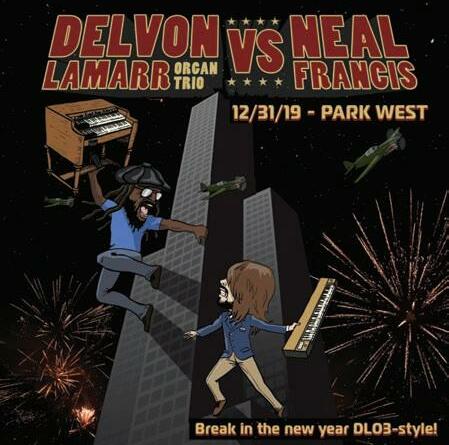







® BUY TICKETS AT Friday, December 13 Park WestDecember 4 Riviera Theatre Saturday November 23 Vic Theatre Friday, November 29 Riviera Theatre SPECIAL GUESTS THE NUDE PARTY OHMME On Sale This Friday at 10am! Saturday, April 4 • Riviera Theatre On Sale This Friday at 10am! Saturday, April 18 • Vic Theatre

 By KERRY CARDOZA
By KERRY CARDOZA
















 Laura Youngberg says the census category gets at “the bigger issue of, how does a community defi ne itself and how the families defi ne themselves.”
Laura Youngberg says the census category gets at “the bigger issue of, how does a community defi ne itself and how the families defi ne themselves.”




 @mdoukmas
@mdoukmas




































































































































 —JAMIE LUDWIG
—JAMIE LUDWIG














































 @fakedansavage
@fakedansavage

























